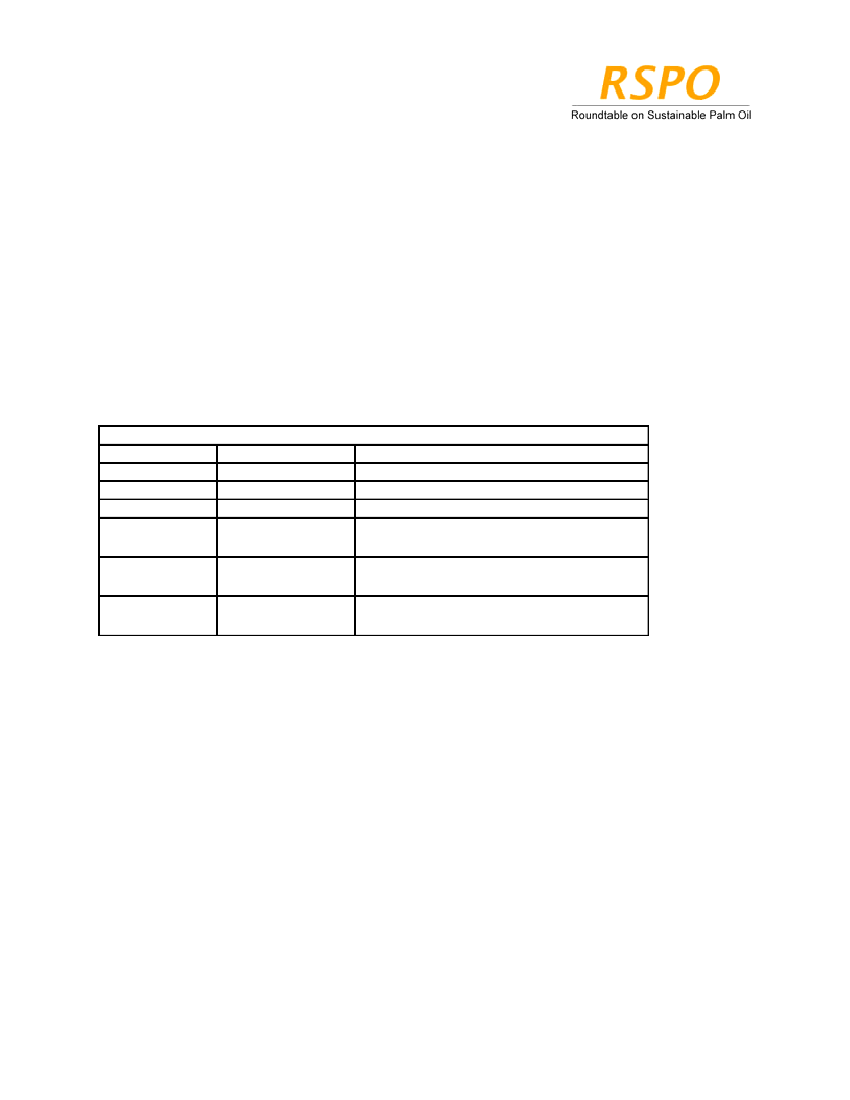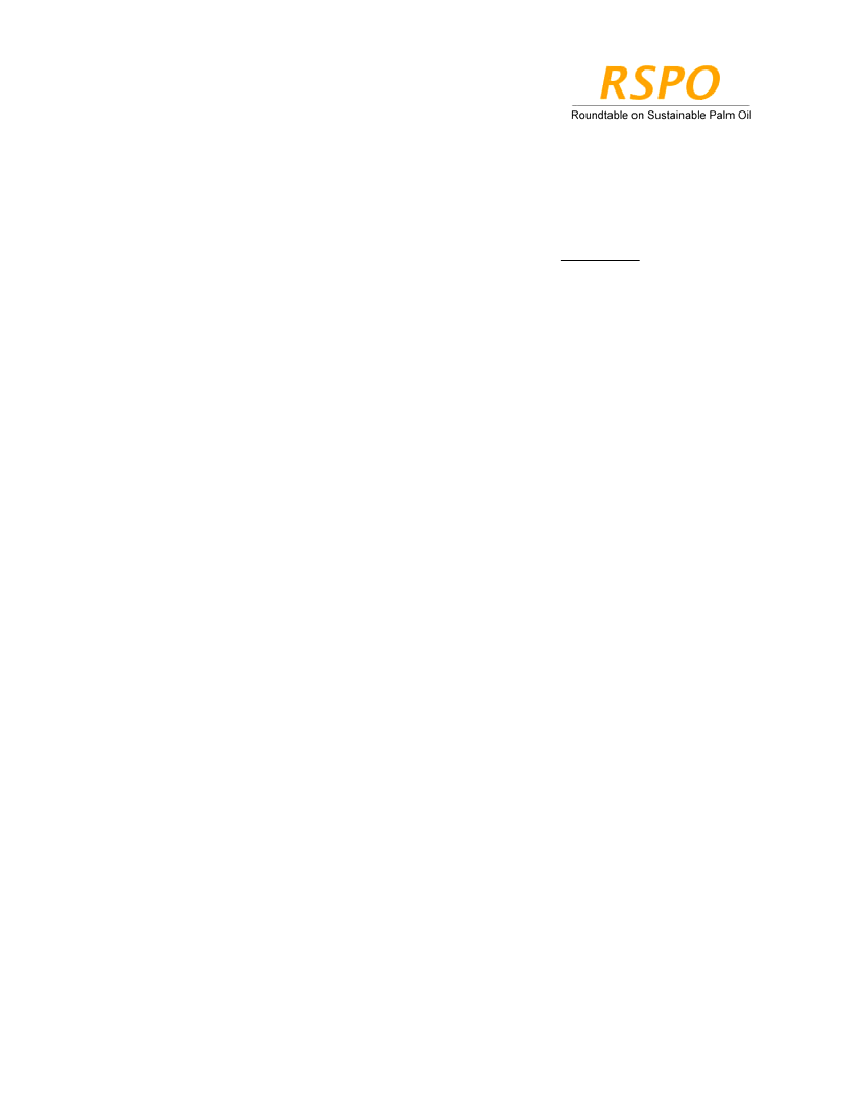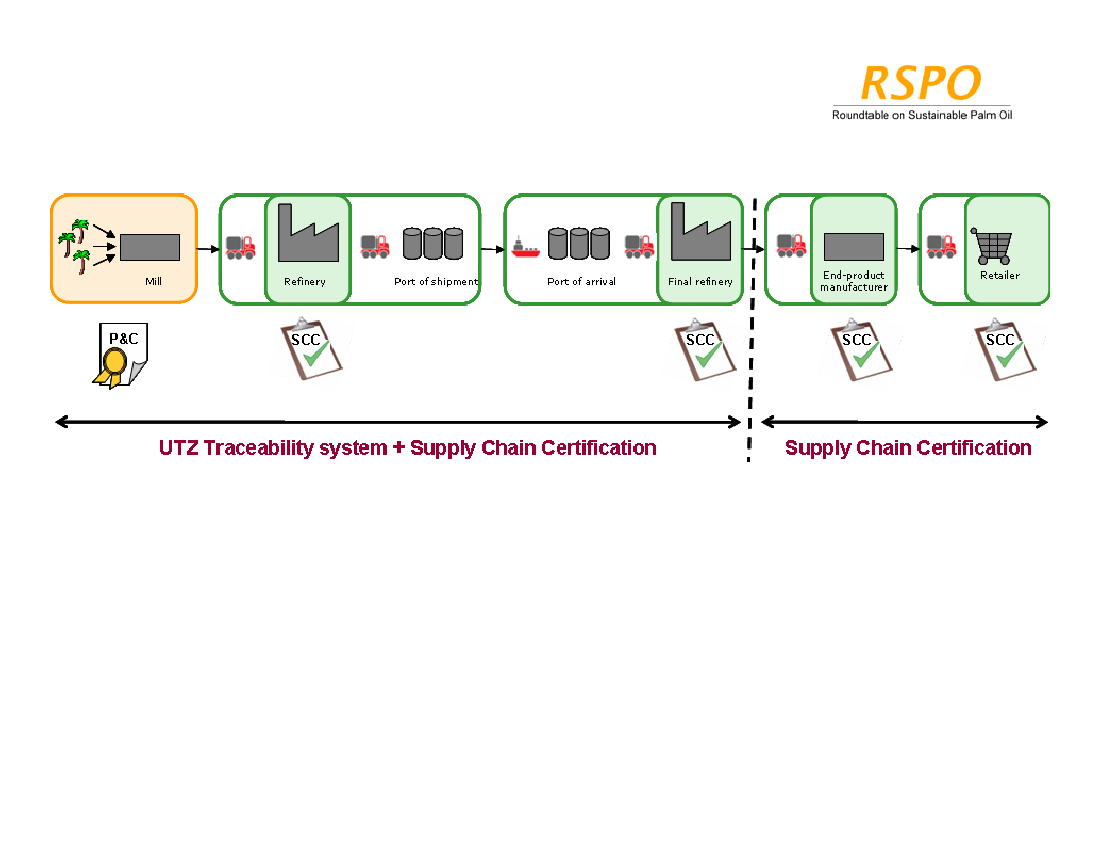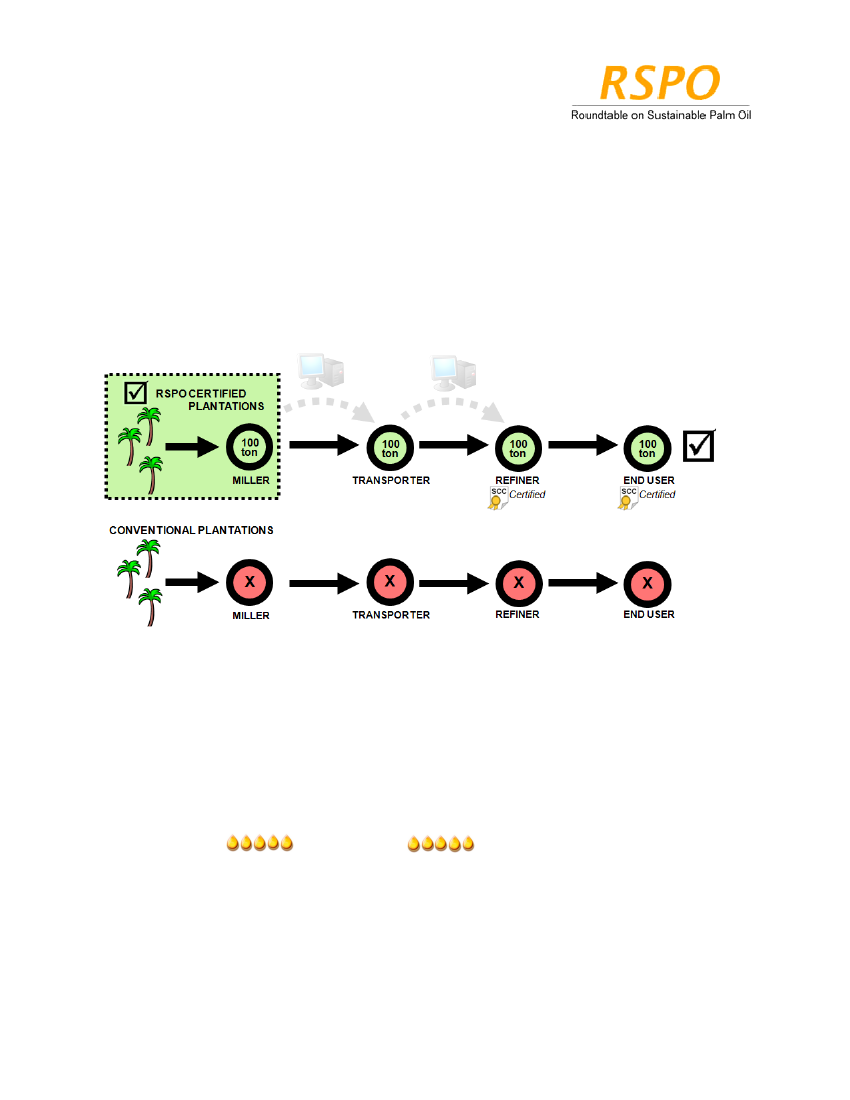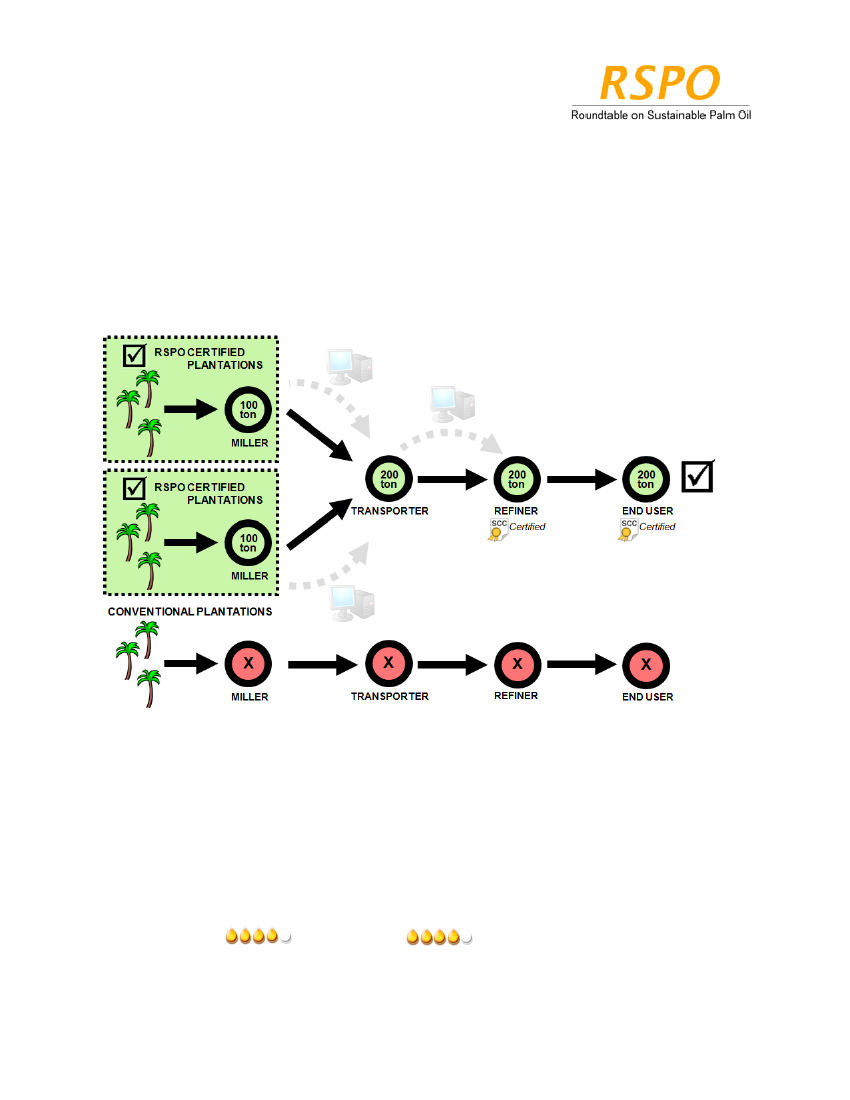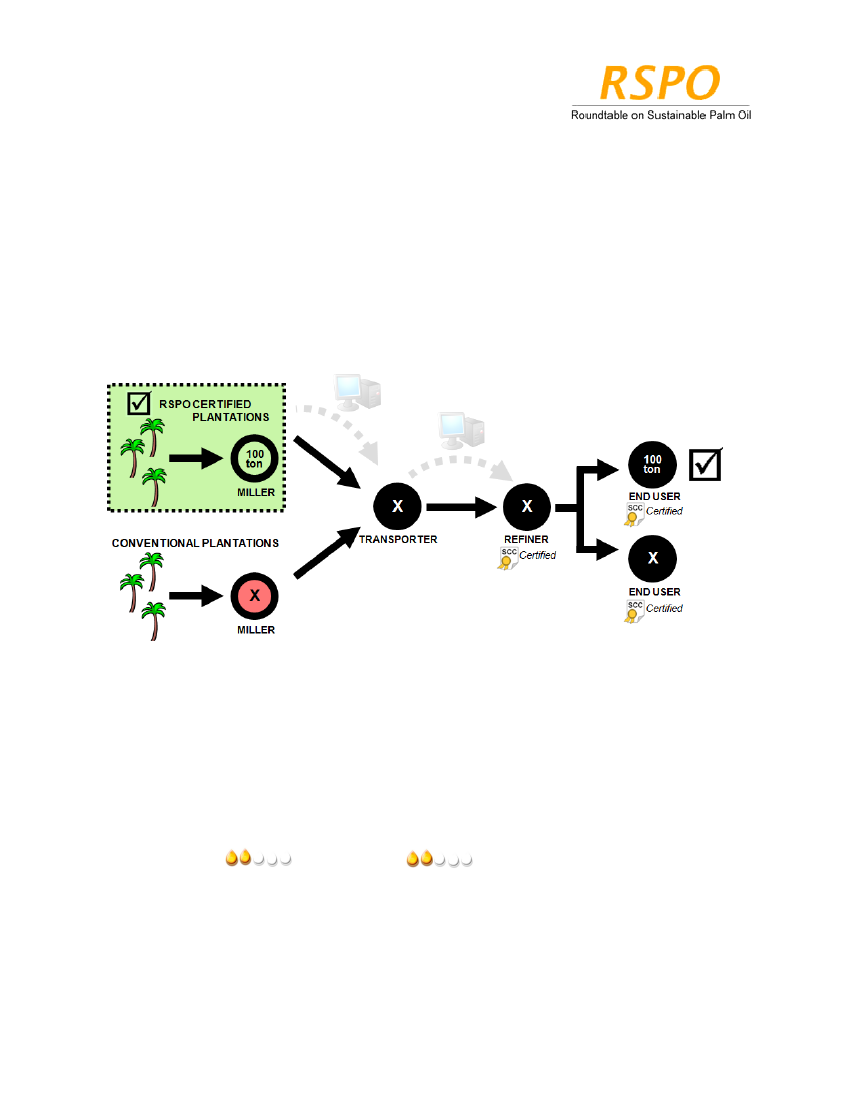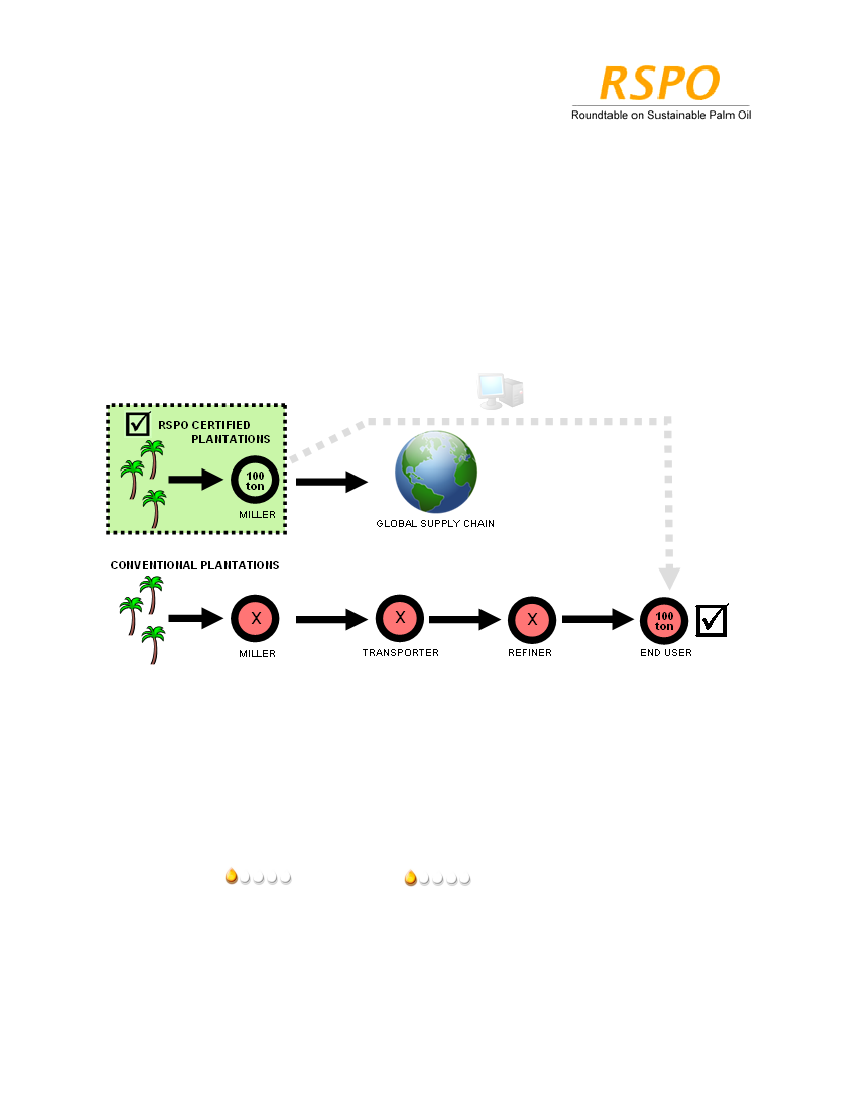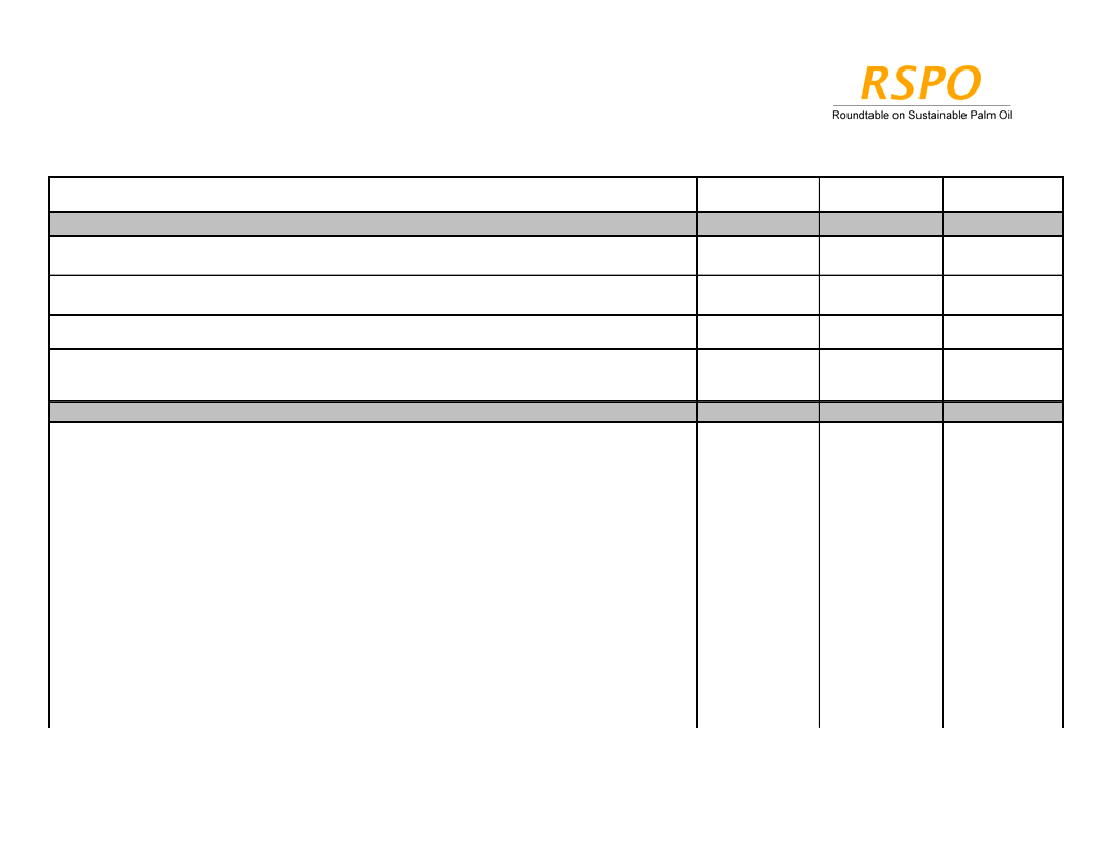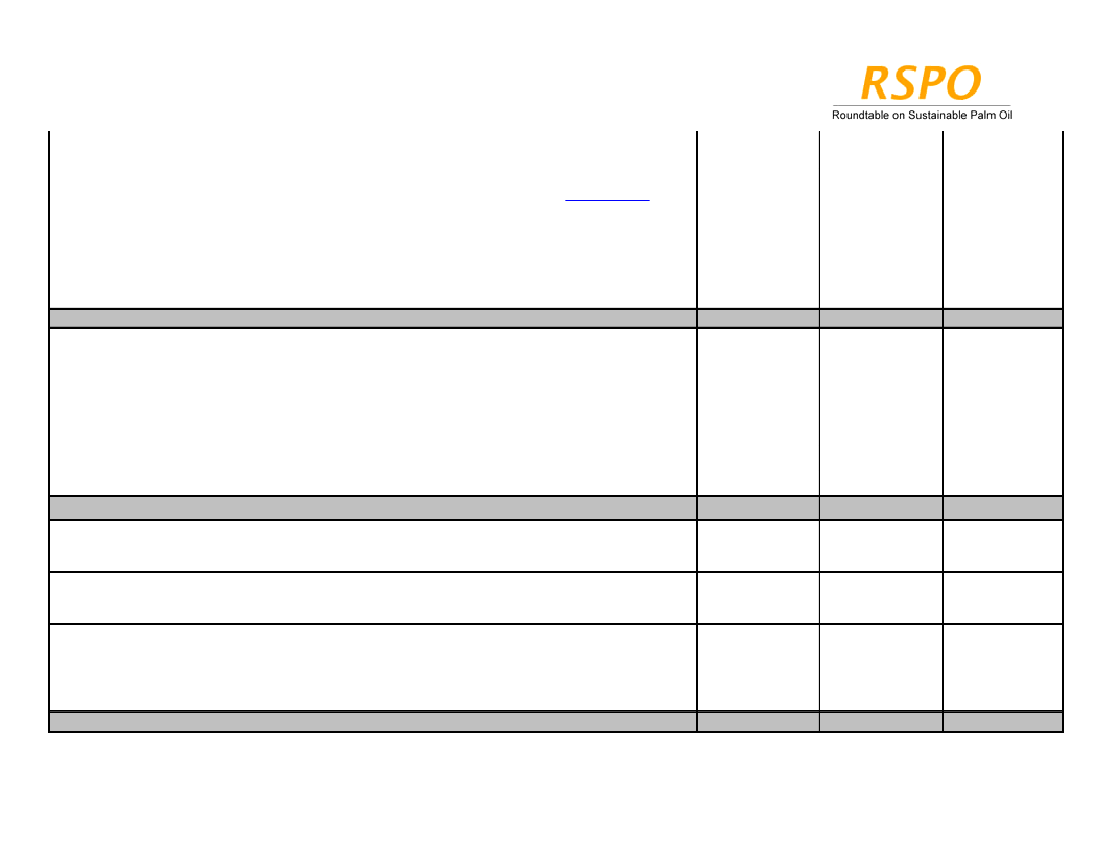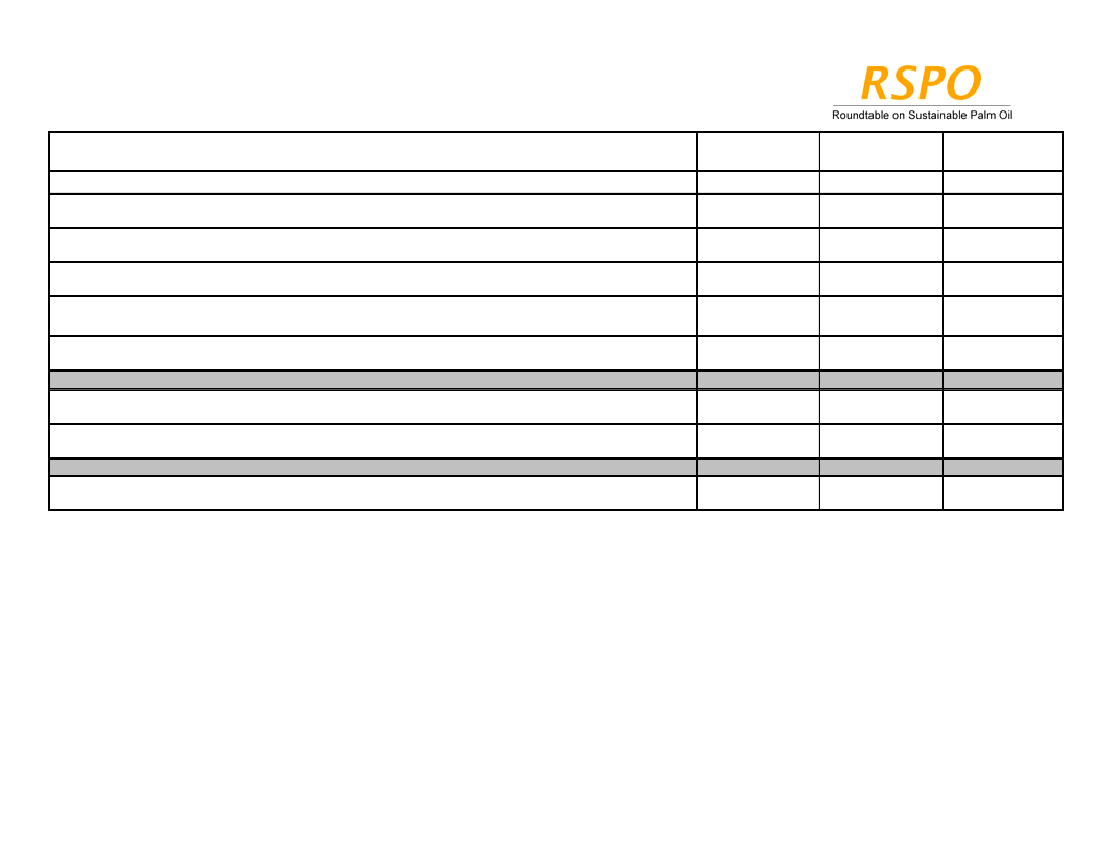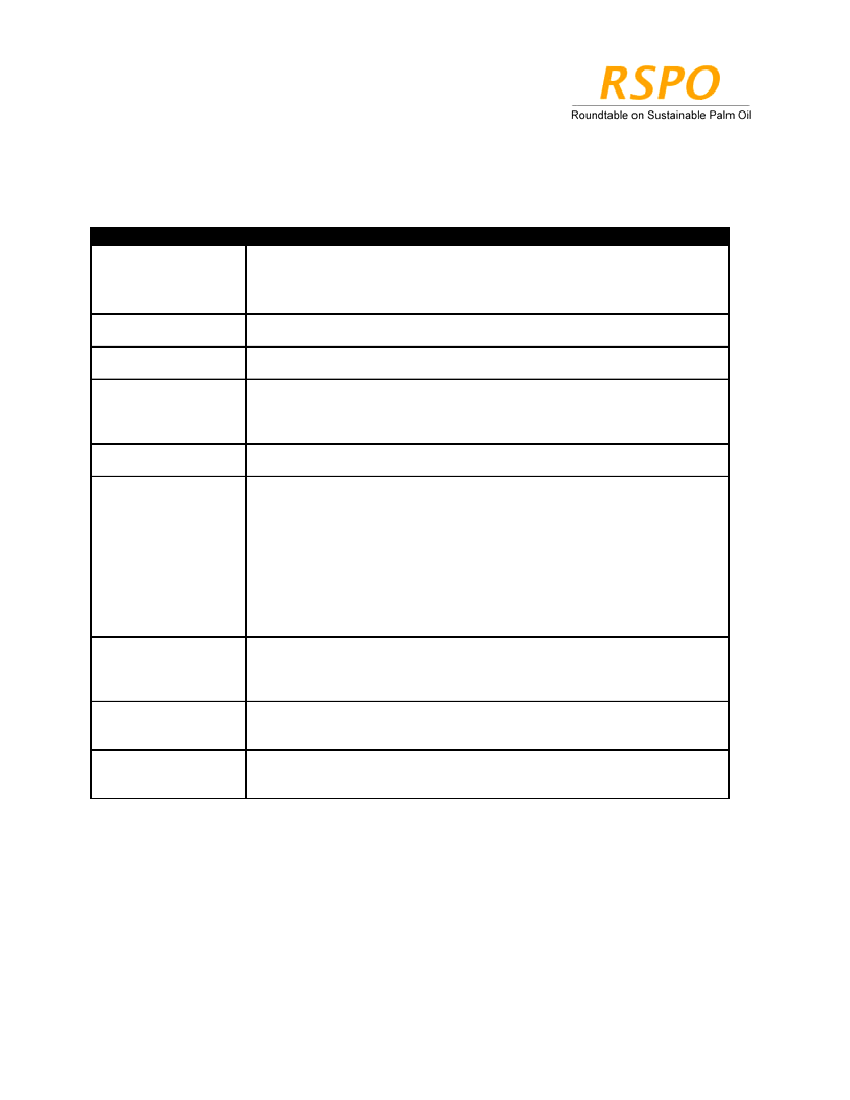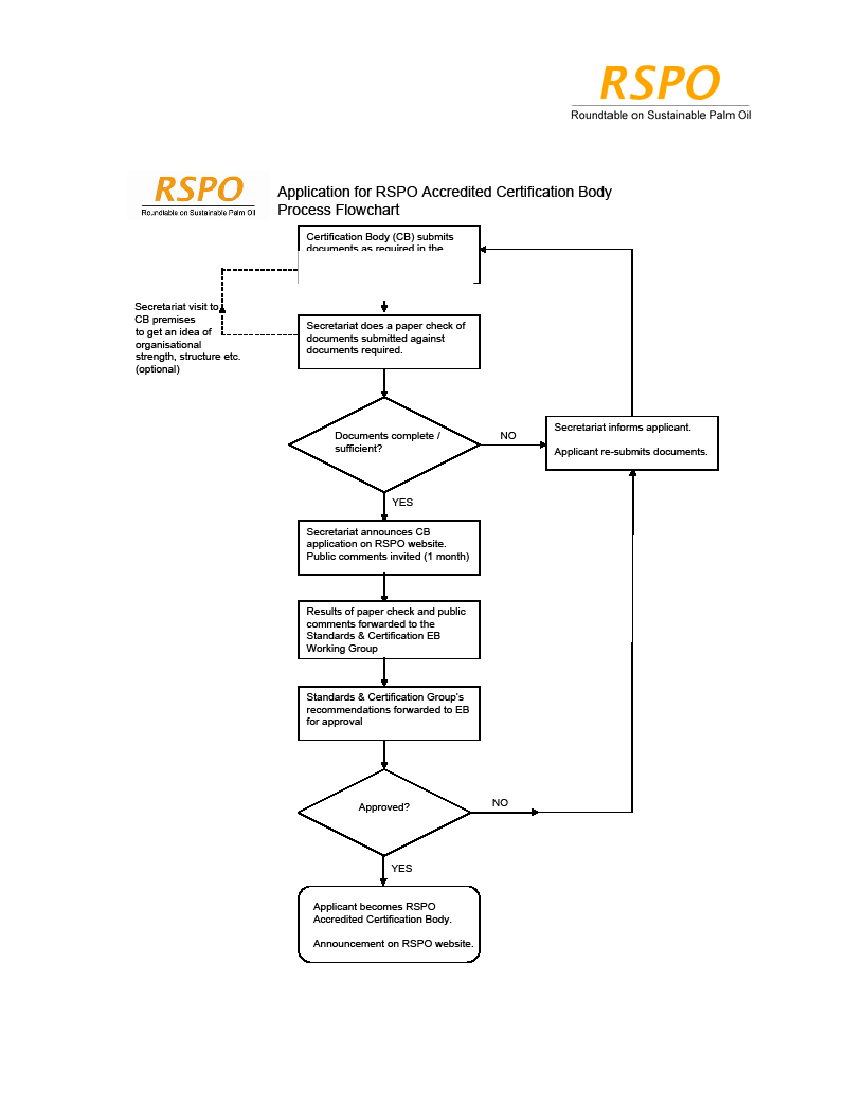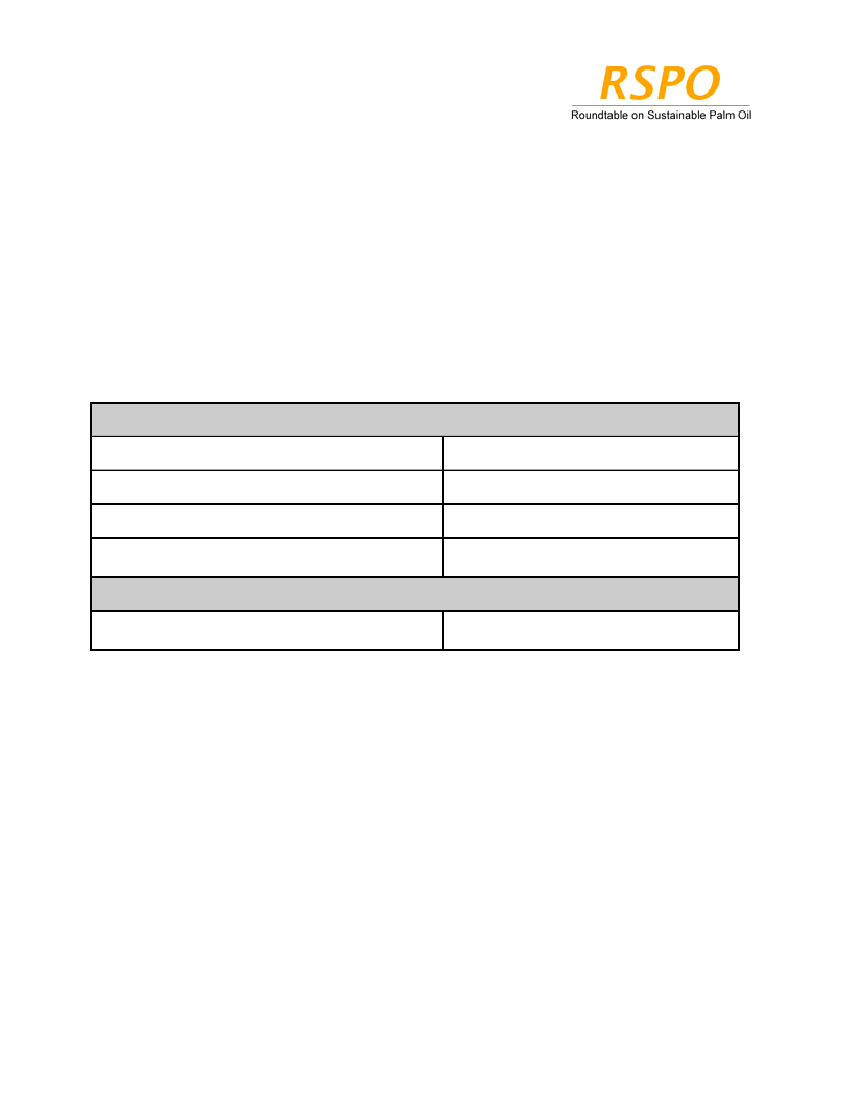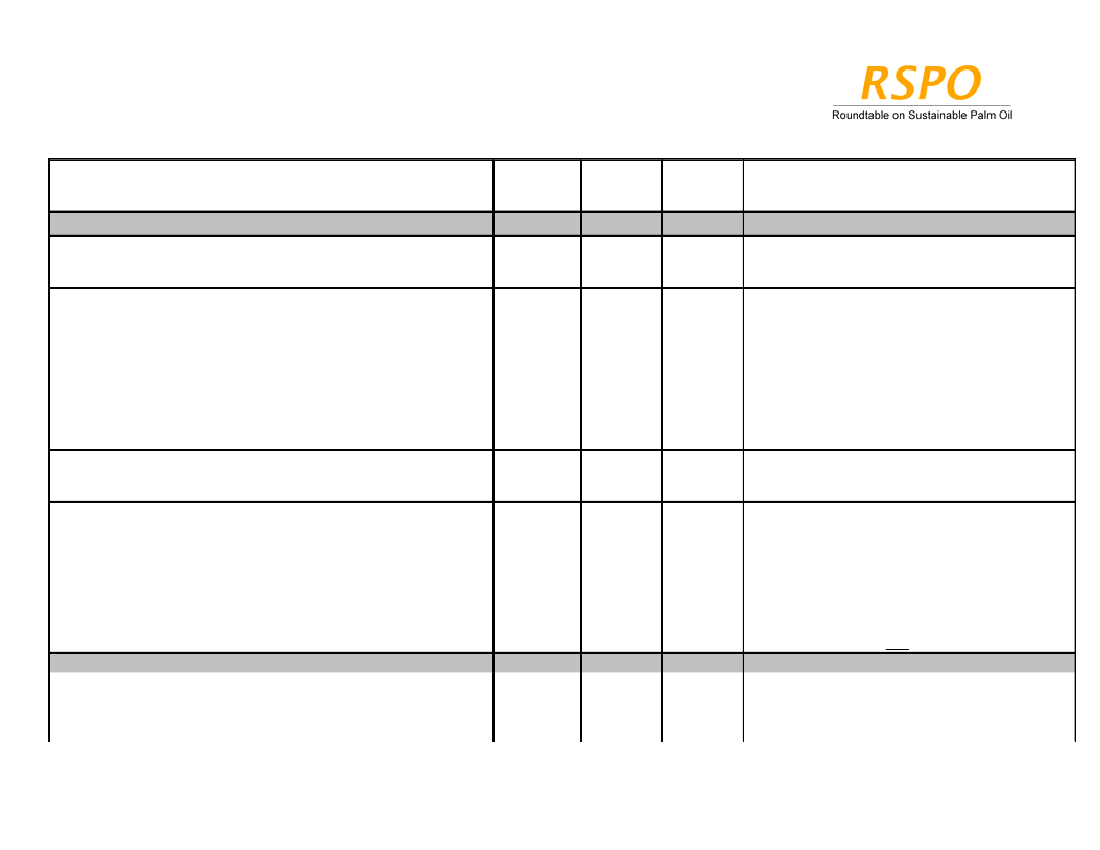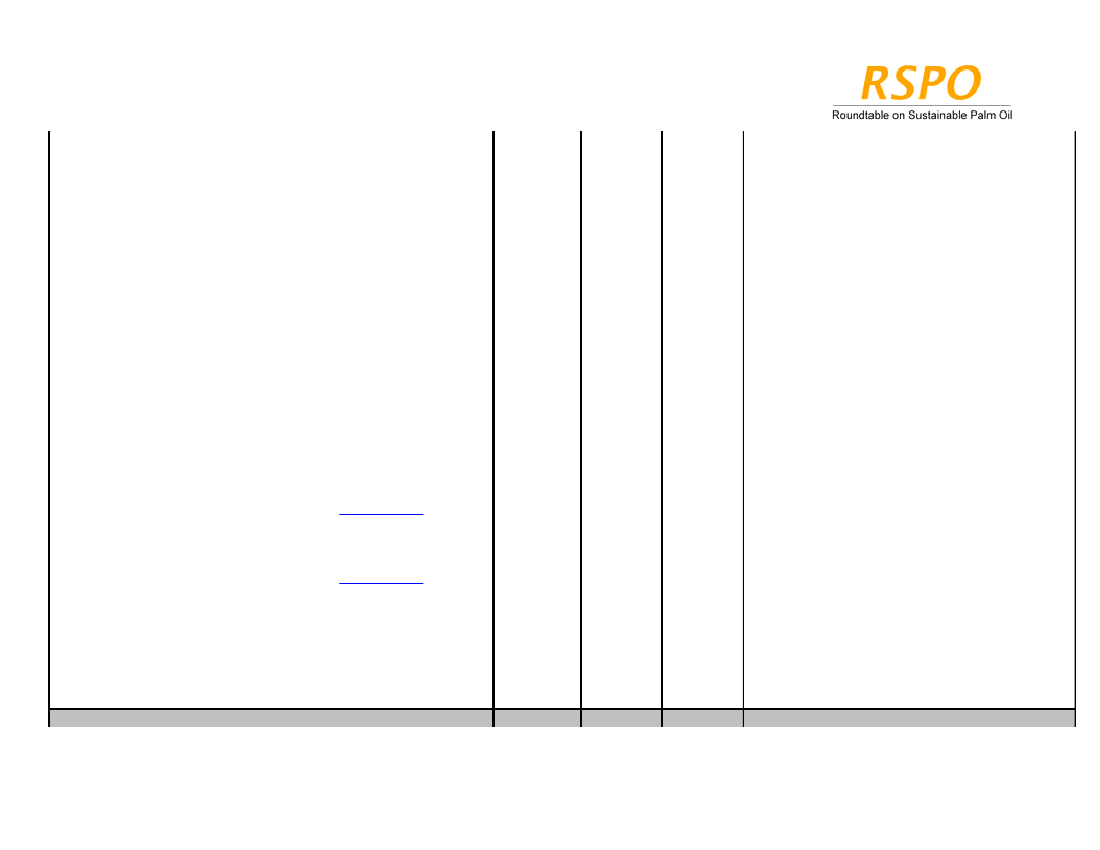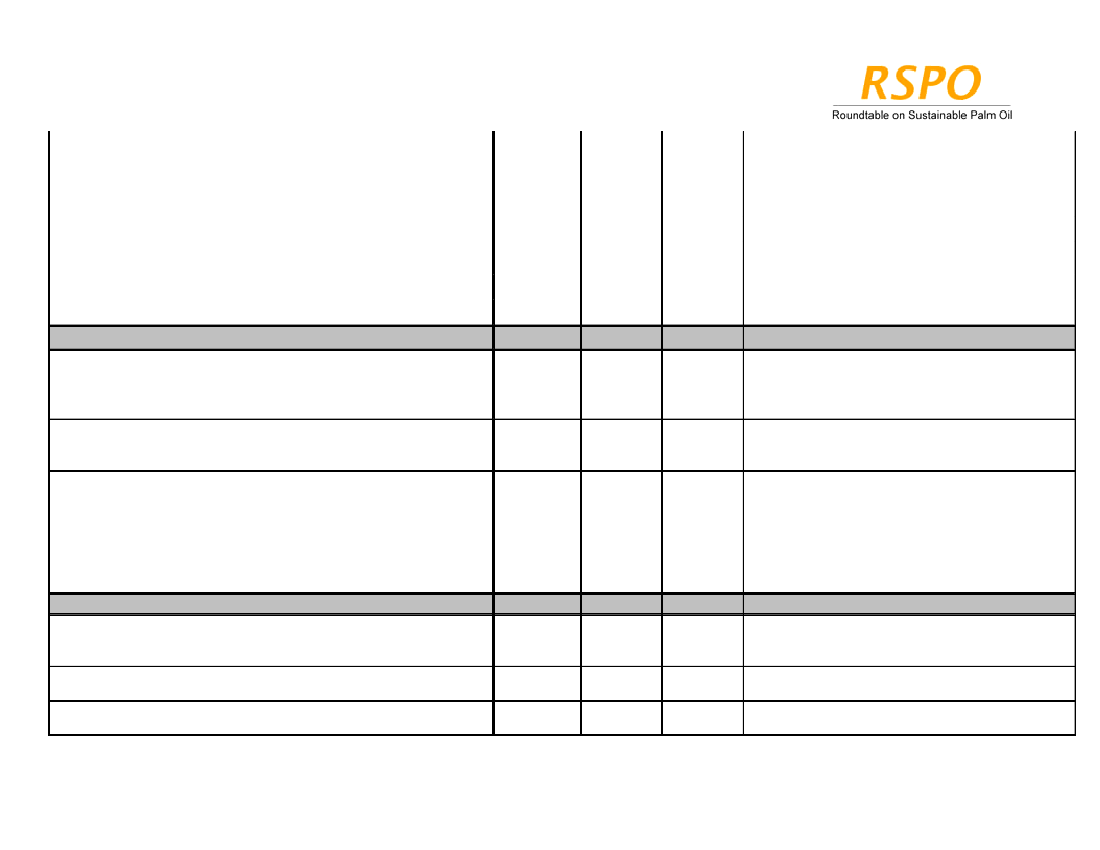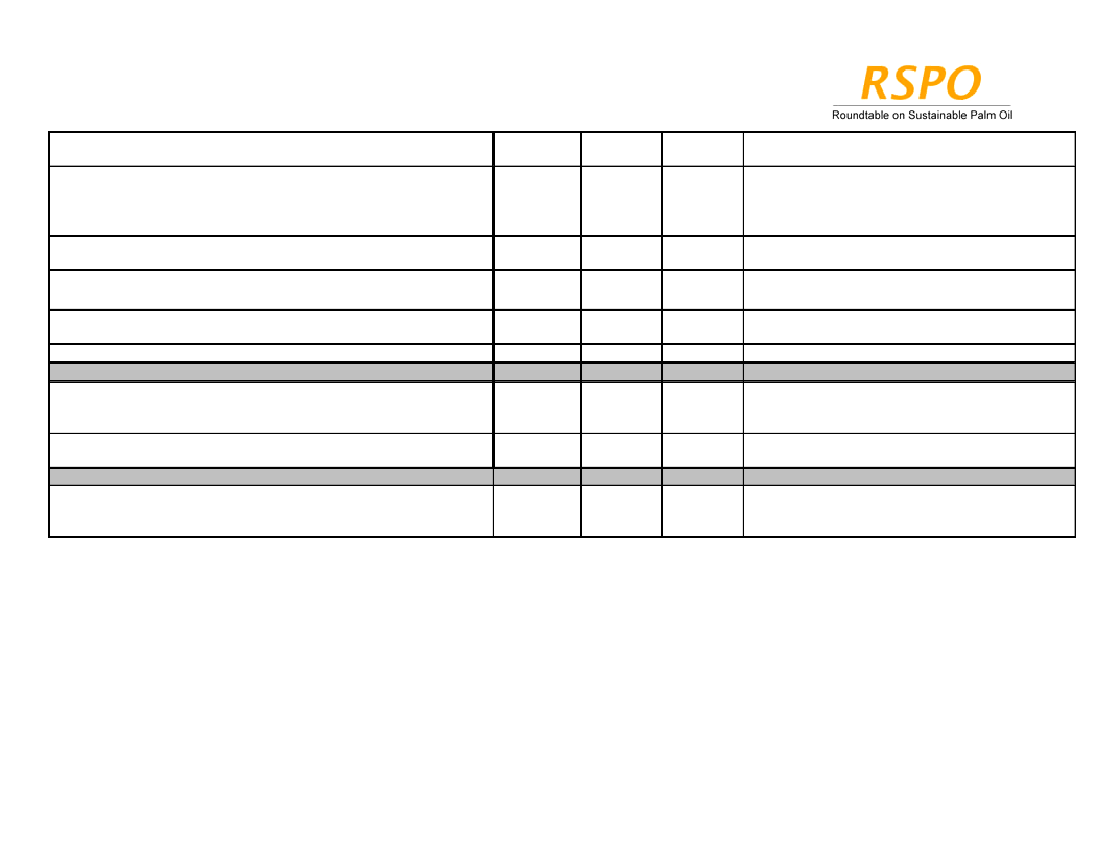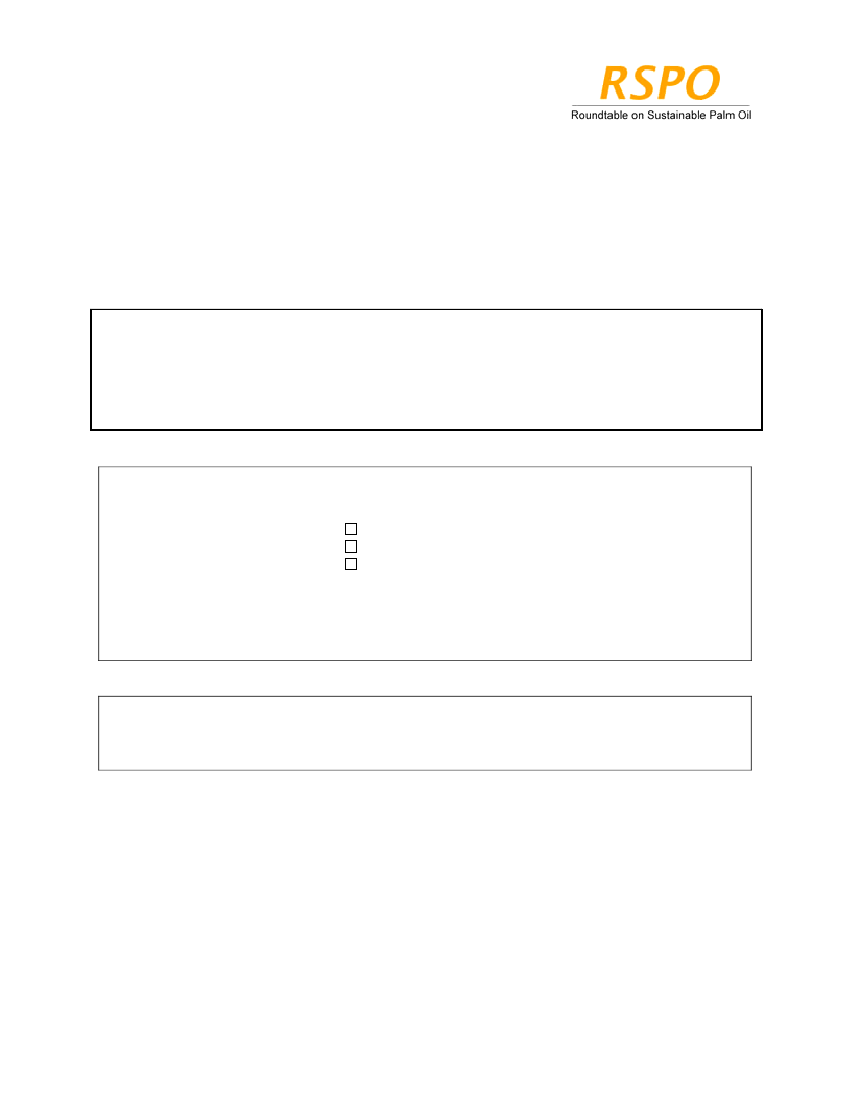Miljøudvalget 2011-12
MIU Alm.del Bilag 87
Offentligt
RSPO Supply ChainCertification Systems
November 2009Approved by RSPO Executive Board 5 November 2009
1
History of DocumentThese RSPO Supply Chain Certification Systems are based on the outcome of the supply chainmodels study adopted at RT4 (November 2006).The first version was finalised by the RSPO Trade and Traceability group that was set up inJanuary 2008 and approved by the RSPO Executive Board in August 2008.It was agreed to review this document within 12 months after its adoption or any other time asdeemed necessary by the RSPO Executive Board.This revised version was reviewed by the RSPO T & T group in 2009 and adopted by the RSPOEB on 5 November 2009.Amendments issued since publicationAmd. no.DateDescription of amendmentAMay 2008First draftBJune 2008Second draft for consultationCAugust 2008Version 1DSeptember 2008Version 2 approved published in October2008EJuly 2009Rev 1 approved by RSPO ExecutiveBoardFNovember 2009Final version Rev 1 approved by RSPOExecutive BoardThis document is written in the English language. The English language as written in thisdocument shall be final and binding until revised by the RSPO. The RSPO does not assume anyliability for errors or misunderstandings introduced, when this document is translated into otherlanguages.
2
Contents1. Introduction2. Accreditation and Approval of Certification Bodies3. Certification Requirements of the RSPO Supply Chain Certification Systems4. Certification Process Requirements of the RSPO Supply Chain Certification Systems5. Interim Approval Procedure
Annexes1. Schematic Overview Palm Oil Supply Chain2. Supply Chain model: Identity Preserved (IP)3. Supply Chain model: Segregation (SG)4. Supply Chain model: Mass Balance (MB)5. Supply Chain model: Book and Claim (B&C)6. Supply Chain certification requirements of different models7. Supply Chain Certification Report8. RSPO Process for Approval of Certification Bodies9. Complaints Procedure10. RSPO Guidelines on Communications & Claims11. Glossary12. Self Declaration Template – Interim Approval ProcedureAppendix 1Supply Chain Certification System as from 31 March 2010
3
1.
Introduction
The Roundtable on Sustainable Palm Oil (RSPO) is a global, multi-stakeholder initiative onsustainable palm oil (see glossary for definition). The principal objective of RSPO is to promotethe growth and use of sustainable palm oil through co-operation within the supply chain andopen dialogue between its stakeholders.RSPO certified sustainable palm oil is produced by a palm oil mill and its supply base when itcomplies with the RSPO Principles and Criteria and this compliance is independently verified byan RSPO approved certification body. Downstream processors or users of RSPO certifiedsustainable palm oil can claim the use of (or support of) RSPO certified palm oil when theyadhere to the intent and requirements the RSPO Supply Chain Certification Systems and this isindependently verified by an RSPO approved and accredited certification body. For a schematicoverview of the palm oil supply chain see Annex 1 of this document.Palm oil can be traded through one of the four supply chain models that are approved by RSPOto be able to preserve the claim to sustainable production:-Identity Preserved: Annex 2-Segregation: Annex 3
--
Mass Balance: Annex 4Book and Claim: Annex 5
The intent of this document on RSPO Supply Chain Certification Systems is to set up a credibleand practical system for the trade of RSPO certified palm oil. In order to ensure credibility, thisdocument covers procedures to guarantee that:-All facilities taking part in the supply chain of RSPO certified palm oil comply with relevantrequirements;-Claims of RSPO members relating to the production, procurement and use of RSPO certifiedpalm oil are true-Certification bodies comply with relevant requirements.- Accreditation bodies apply all relevant requirementsThis document contains:-Accreditation and approval requirements for certification bodies (section 2)
-----
Certification Requirements of the RSPO Supply Chain (section 3)Requirements for the Certification Process of the RSPO Supply Chain (section 4).An Interim Approval Procedure to allow for swift introduction of RSPO certified palm oil in themarket (section 5). This procedure in applicable until 31 March 2010.A detailed description of 4 RSPO approved supply chain models and their requirements (seeannexes 2, 3, 4 and 5)The RSPO Supply Chain Certification System that applies as from 1 April 2010 (Appendix 1)
4
2.2.1
Accreditation and Approval of Supply Chain Certification BodiesCertification must be undertaken by a certification body that conforms to these
accreditation and approval requirements. Individuals cannot be approved as a certification body.2.2RSPO will use a mechanism for approving certification bodies that will be based on
accreditation against ISO/IEC Guide 65: 1996 (General requirements for bodies operatingproduct certification systems) where the generic accreditation is also supplemented by a set ofspecific RSPO certification process requirements. More detailed requirements can be found inthe schematic overview in Annex 8 ‘RSPO Process for approval of Certification Bodies’2.3Certification bodies seeking or holding approval by the RSPO shall be able to prove at all
times that they hold a relevant, valid accreditation by a national or international accreditationbody, demonstrating that all aspects of their organisation, systems and procedures relevant forconducting certification against the intent and requirements of the RSPO Supply ChainCertification Systems conform to the relevant provisions of ISO 17021:2006, and/or ISO Guide65 and other applicable international norms.2.4The accreditation body itself must be operating in accordance with the requirements of
ISO 17011:2004 Conformity assessment general requirements for accreditation bodiesaccrediting conformity audit bodies. This must be demonstrated either as a signatory to theappropriate International Accreditation Forum (IAF), Multilateral Recognition Arrangement (MLA)or through full membership of the International Social and Environmental Accreditation andLabelling Alliance (ISEAL).2.5RSPO requests accreditation bodies to notify RSPO if a complaint about the certification
body is received by any RSPO stakeholder concerning their competency or process or theoutcome of an accreditation audit or implementation. In accordance with ISO/IEC 17011 theaccreditation body shall handle complaints within 60 days. Should any accreditation body fail toresolve a complaint within that timeframe, it shall inform the RSPO Secretariat.2.6In order to provide the technical rigour and credibility required for a sector-specific
approach such as the RSPO Supply Chain Certification Systems, RSPO has supplemented therequirements set out in ISO 17021:2006 and 65 with a set of specific certification process
5
requirements. These additional requirements for certification against the intent andrequirements of the RSPO Supply Chain Certification Systems must be incorporated within thecertification body’s accredited systems. These additional requirements for certification againstthe intent and requirements of the RSPO Supply Chain Certification Systems are defined insection 4.2.7The certification body seeking or holding approval by the RSPO shall ensure they are
accredited against the scope of these RSPO Supply Chain Certification Systems and ISOGuides 65 and or 17021:2006.Annex 8 gives a schematic description of the Approval Process for accredited certification bodiesby the RSPO.
6
3.
Certification Requirements of the RSPO Supply ChainCertification Systems
3.1Unit of CertificationIdentity Preserved, Segregation, Mass Balance / Before refineryWhen the Identity Preserved, Segregation or Mass Balance models are used before refinery, alloperators who take legal ownership and physically receive the RSPO Certified Sustainable PalmOil or products derived thereof and who are part of the supply chain of RSPO CertifiedSustainable Palm Oil or products derived thereof need to be RSPO supply chain certified.The Supply Chain Certification audit shall take place on individual facility level.Multi-site certification is possible under specific requirements (see paragraph 4.7 of thisdocument)Identity Preserved, Segregation, Mass Balance / After and including refineryWhen the Identity Preserved, Segregation or Mass Balance models are used after and includingrefinery, all operators who take legal ownership of RSPO Certified Sustainable Palm Oil orproducts derived thereof and who are part of the supply chain of RSPO Certified SustainablePalm Oil or products derived thereof need to be RSPO supply chain certified.. This requirementapplies up to and including the end product manufacturer (See Glossary for definition).The Supply Chain Certification audit shall take place on individual facility level.Multi-site certification is possible under specific requirements (see paragraph 4.7 of thisdocument)Book and ClaimUsers of the Book and Claim system need to be members of RSPO or GreenPalm. For users ofthe RSPO Book and Claim system (GreenPalm) random independent audits are organized for aportion of end-users (or parties that want to make a claim). The portion is annually determinedby the RSPO executive board or an ad hoc group appointed by The RSPO EB. The audits shallbe conducted by certification bodies that are accredited and approved according to section 2 ofthis document.3.2Certification RequirementsIdentity Preserved, Segregation, Mass BalanceEither the operator at facility level or its parent company seeking certification shall be a memberof the RSPO.To achieve supply chain certification, a company shall demonstrate compliance with the intentand requirements of the RSPO Supply Chain Certification Systems including those described in
7
Annex 6 of this document. A certification body approved by the RSPO (see section 2) shall verifycompliance against the intent and requirements of the RSPO Supply Chain CertificationSystems.In cases where an operation seeking or holding certification outsources activities to independentthird parties (e.g. subcontractors for storage, transport or other outsourced activities), theoperation seeking or holding certification shall ensure that the independent third party complieswith the intent and requirements of the RSPO Supply Chain Certification Systems.Subcontractors fall under the responsibility of their contractors and as such do not need to becertified.The certification body shall verify compliance of all activities conducted by subcontractorsengaged by an operation seeking or holding certification with the intent and requirements of theRSPO Supply Chain Certification Systems.The operation seeking or holding certification shall ensure subcontractors are covered througheither a signed and enforceable agreement with the subcontractor or the subcontractor shallseek its own certification.The operation seeking or holding certification shall furthermore ensure (e.g. through contractualarrangements) that independent third parties engaged, provide unrestricted access to theirrespective operations, systems, and any and all information to certification bodies that are dulyapproved by the RSPO when this is announced in advance.The operation seeking or holding certification must also meet all registration and reportingrequirements for the appropriate supply chain under the approved RSPO supply chain managingorganisation (UTZ Certified).Claims made must be in accordance with the RSPO Guidelines on Communication & Claims onthe RSPO website and in Annex 10Book and ClaimAt the request of a certification body, users of the RSPO Book and Claim system (GreenPalm),who are not producers, need to show:-Compliance with the rules for use of the RSPO Book and Claim system (Currently theGreenPalm Program Membership Rules: http://www.greenpalm.org/?/how_it_works/)-Claims made are in accordance with the RSPO Guidelines on Communication & Claims inAnnex 10.
8
3.3 RegistrationSupply chain actors who take legal ownership of RSPO Certified Sustainable Palm Oil orproducts derived thereof and physically handle the material and who are part of the supply chainof RSPO Certified Sustainable Palm Oil before and up to the (final) refinery need to register theirtransaction in the RSPO Traceability System/ UTZ Certified system upon the moment of physicalshipment. Actors who must register include:- Palm oil mills producing RSPO certified palm oil- Refineries (The final refinery – the refinery that does not further deliver to other refineriesdirectly or indirectly via traders - only needs to confirm the receipt of shipments; it does notneed to do sales announcements)- Traders who are physical owners of the palm product. (Traders that are part of a string arelegal owners, but they do not physically handle the material. Therefore they are excludedfrom registration; the Traceability number will accompany shipping documents.)For definitions of legal owner, refinery and string, please see the Glossary.For more details on the registration please see the Guidelines on the RSPO Traceability System/Utz Certified system onwww.utzcertified.org/palmoil
3.4ClaimsIdentity Preserved, Segregation, Mass BalanceNo claims relating to RSPO certified palm oil or palm oil product shall be made without validcertification against the intent and requirements of the RSPO Supply Chain CertificationSystems by a certification body approved by the RSPO. Correct use of claims is verified by thecertification body that is approved by the RSPO (see Annex 6 and Annex 10 for requirements onclaims to be used).In supply chains working with Identity Preservation and Segregation models the aim must be toachieve 100% segregation. However, the RSPO recognizes that especially in the early days ofRSPO the Certified Sustainable Palm Oil flows will be low and the necessary cleaning andclearing of facilities would present the supply chain with unusually high costs. For that reason a95% minimum standard will be deemed acceptable to RSPO to qualify under the IP andSegregation supply chain models. This minimum standard will be reviewed as volumes ofCertified Sustainable Palm Oil increase in the supply chain.Book and ClaimUsers of the RSPO Book and Claim system (GreenPalm) shall ensure their claims comply withthe intent and any and all requirements of the RSPO including the RSPO Guidelines onCommunication & Claims see annex 10 of this document.
9
Certificates are created/based on CPO-equivalents (each GreenPalm certificate equals onemetric ton of RSPO-certified CPO, Crude Palm Oil) . To effectively match physical volumes of alldifferent palm oil derivatives with GreenPalm certificates, a calculation tool is available onwww.greenpalm.org.
10
4.Certification Process Requirements of the RSPO Supply ChainCertification Systems4.1Scope
This section prescribes the process that a certification body shall follow in carrying out an auditof a processing facility that is seeking certification to requirements of the RSPO Supply ChainCertification Systems.The purpose of this document is to:-To establish the minimum requirements of a consistent methodology for enabling certificationagainst the intent and requirements of the RSPO Supply Chain Certification Systems toenable all certification bodies to operate in a consistent and controlled manner.-To provide documentation designed to assure long-term continuity and consistency of thedelivery of certification against the requirements of the RSPO Supply Chain CertificationSystems.- To serve as a training document for certification bodies.4.2Requirements for the RSPO Approved certification bodyThe certification body approved by the RSPO shall implement any and all provisions includinglegal arrangements, to ensure that any and all persons, subcontractors or other entities (e.g.permanently employed and freelance auditors, experts, consultants, etc.) engaged on its behalfin auditing against the intent and requirements of the RSPO Supply Chain Certification Systems,are knowledgeable of, comply with the intent and requirements of the RSPO Supply ChainCertification Systems as a whole and this section 4 in particular to the fullest extent possible.
4.3
Requirements for Certification Bodies’ Auditors
4.3.1 Auditors or other persons engaged by the certification body are not permitted to carry outany activities which may affect their independence or confidentiality and therefore should nothave worked (as an employee or advisor) for the client during the last 3 years.4.3.2 a. Any person or entity engaged by the certification body or the certification body itselfshall declare any and all interests which may potentially affect the certification process and/orwhich could possibly constitute a conflict of interest, in advance of engaging in a certificationprocess against the requirements of the RSPO.b. Any person or entity engaged by the certification body or the certification body itself shallreport any circumstance or pressure that may influence its independence or confidentialityimmediately to the executive management of the certification body.c. The executive management of the certification body shall notify the RSPO of any such reportand ensure that any such report is included in the certification report of the certification processand in the file of the client.
11
d. Any person or entity engaged by the certification body or the certification body itself shall onlyengage in services for a client if the certification body can demonstrate that it has not engaged incertification of the same client against the RSPO Supply Chain Certification Systems. Doubtfulcases shall be discussed with RSPO, prior to engaging with the client.4.3.3 The minimum auditor qualifications are the following:-Advance post high school education degree or diploma or equivalent
------
Technical skills and qualifications related to and as necessary for the certification process,like demonstrable relevant experience in other relevant certification schemesTraining in the practical application of the RSPO Supply Chain Certification Systems andbasic auditing techniques requiredDemonstrate successful completion of a recognised lead assessor course e.g. a ISO9000/19011 lead auditor courseLanguage skills suitable for verbal and written communication with the client and the client’srelevant stakeholder groupsDemonstrable field working experience in the food supply chain, or equivalent related to andas necessary for the certification processSupervised period of training in practical auditing by a qualified lead auditor with at least 15days audit experience in similar certification schemes (i.e. including traceability), achieving aminimum of 2 audits at different organisations.
4.4
Client application and Contract
4.4.1 The certification body shall ensure that any operation seeking or holding certificationagainst the requirements of the RSPO are provided with all necessary information concerningthe RSPO as a whole, the RSPO Supply Chain Certification Systems, the RSPO Guidelines onCommunication and Claims, including the certification body’s own standards, indicators, verifiersand checklists or equivalent and other documentation available. If potential clients have anyfurther questions concerning the RSPO these shall be directed to the RSPO website atwww.rspo.org.4.4.2 The certification body shall enter into a contractual agreement for certification services withan operation seeking or holding certification against the RSPO Supply chain systems andmaintain a record of any agreement before proceeding with any service provision.The contract shall specify the scope (supply chain model to be audited), duration and costsrelated to the audit and also outline the certification body’s and client’s contractual rights andobligations. This must include the client’s right to object to the certification body’s audit processand this right must be contained in the procedures of a CB. The contractual agreement shallinclude relevant provisions on confidentiality and declarations of interest (see section 4.2above).
12
4.4.3 The operation seeking or holding certification against the requirements of the RSPO shallsubmit any and all details about their organisation, their management system and theiroperations deemed necessary by the certification body to demonstrate how the intent andrequirements of the RSPO Supply Chain Certification Systems are integrated into theirorganisation, their management system and their operations.The submission of information shall include the details and certification reports of any and allother certifications that are held by the operation (e.g. food safety, quality, etc.), including thecontact details for any and all other certification bodies involved with said operation.4.4.4 The certification body shall review the submission to ensure that all elements of therespective RSPO Supply Chain Systems are addressed satisfactorily and fully meet the intent ofthe RSPO Supply Chain Certification Systems. The certification body shall clarify any issues orareas of concern with the operation seeking or holding certification.4.4.5 If the organizational systems, management system and operational systems of theoperation seeking or holding certification appear, at the discretion of the certification body, viableto fully meet the intent and any and all provisions of the RSPO Supply Chain CertificationSystems, the certification body shall recommend that said operation proceeds with an on-siteconformity assessment.
4.5
Audit Planning
4.5.1 Upon successful completion of the provisions of section 4.4 the certification body shallplan the conformity assessment.4.5.2 The certification body shall take account of the supply chain model(s) selected, theorganizational systems, the management systems and the operational systems used and anyother certifications held (such as food safety, quality, etc.) by the operation seeking or holdingcertification when determining the level, details and planning of the conformity assessmentrequired to assess compliance with the intent and requirements of the RSPO Supply ChainCertification Systems.4.5.3 The certification body may synchronise and combine RSPO Supply Chain audits withother on-site audits (such as food safety, quality, etc) where possible and appropriate.4.5.4 Certification bodies shall recognise certificates issued under RSPO Supply ChainCertification Systems by other RSPO approved certification bodies.
13
4.6
On-site Audit
4.6.1 The certification body’s auditor shall follow the guidance on auditing as provided in ISO19011.4.6.2 The on-site audit shall accomplish the following: Review whether the organisationalsystems, the management systems and the operational systems, including any documentedpolicies and procedures of the operation seeking or holding certification, are sufficient andadequately implemented to meet the intent and requirements of the RSPO Supply ChainCertification Systems.Pertinent RSPO Supply Chain records relating to the receipt, processing and supply of certifiedpalm oil being supplied to customers wishing to make a RSPO claim to the certified palm oilshall be reviewed retrospectively until the previous audit. If applicable the review shall alsoinclude all records retained during the interim approval period.
4.6.3
At the conclusion of the on-site audit the certification body auditor shall conduct a closingmeeting with the client’s representative(s), including the management. During the closingmeeting the certification body shall ensure that:- The client is informed that until they receive written confirmation of their RSPO Supply Chaincertification registration and its expiry date that they are not certified and cannot make anyclaims concerning certification;- The client is made aware what actions they may have to complete before certification canproceed; and-The client is made aware of the findings of the audit team including any deficiencies whichmay result in a negative certification decision or which may require further actions to becompleted before a certification decision can be taken.-A detailed record is compiled of the closing meeting including a list of the participants in themeeting, a detailed description of the information supplied to the operation seeking orholding certification, any information additionally supplied by the operation, and any otherinformation exchanged, including a written record of the notice that the findings of the auditteam are tentative pending review and decision making by the duly designatedrepresentatives of the certification body.The record of the closing meeting shall be signed by the lead auditor and the most seniorrelevant management representative of the operation seeking or holding certification.4.7 Multi-site certifications and audits4.7.1 Multi-site certifications or audits are permitted when several processing facilities areentirely controlled by a single management organisation and the supply chain management isorganised similarly in the different facilities.4.7.2 If a multi-site certification or audit is conducted all rules in this section apply.
14
4.7.3 When a multisite certification or audit is conducted the auditor(s) shall:- determine that the client’s management system is adequate to ensure all processing facilitiesunder its control meet the RSPO Supply Chain Certification Systems and the intent thereofand- check compliance with the RSPO Supply Chain Certification Systems of all facilities.4.7.4 A multisite certification will only be awarded by the certification body if:- the client’s management system sufficiently demonstrates it ensures compliance with theRSPO Supply Chain Certification Systems of all processing facilities under its managementand- compliance with the RSPO Supply Chain Certification Systems is established in all of thefacilities checked during the random audits.
4.8
Results and Recommendations
4.8.1 The certification body auditor shall prepare a certification report on the certification processagainst the RSPO Supply Chain Certification Systems (see Annex 7 for minimum report contentrequirements).4.8.2 All Non-conformances observed during an audit shall be classified as ‘major’ since allrequirements for Supply Chain certification have to be met before granting certification.4.8.3 All non-conformances shall be addressed satisfactorily by the operation before certificationmay be granted by the certification body. If non-conformances are not addressed within three (3)months of the audit, a full re-audit shall be required. The certification body shall assess theeffectiveness of the corrective and/or preventive actions taken before closing out the non-conformances.4.8.4 Non-conformances raised after the certification are serious (i.e. must be considered as amajor) and the integrity of the RSPO Supply Chain Certification is at risk. RSPO shall beinformed of these immediately. A maximum of one month is to be given to the certified client tosatisfactorily address the non-conformance. The certification body shall assess theeffectiveness of the corrective and/or or preventive actions taken. Should the non-conformancenot be addressed within the one month maximum timeframe, a suspension or withdrawal of thecertificate and a full re-audit may be necessary.Where objective evidence indicates that there has been a demonstrable breakdown in thesupply chain caused by the certified client’s actions or inactions, and that palm oil product thathas been or is about to be shipped which is falsely identified as RSPO certified productimmediate action needs to be taken by the certification body, and the RSPO Supply Chaincertification should be suspended until such time that it has been addressed. The RSPO shallbe notified within 24 hours of this occurrence and further impacts on relevant supply chaincertifications.
15
4.8.5 If no non-conformances are observed at an audit or when the corrective action plan hassatisfactorily addressed raised non-conformance(s), the client shall be recommended for (re-)certification.
4.9
Certification Awarded
4.9.1 Certification bodies shall issue certificates with the following information:-Name of operation certified- RSPO member number of operation certified-Address of all relevant sites of operation(s) seeking or holding certification including contactdetails of the management representative responsible for overseeing the certificationprocess.-Date of issue and expiry.- Date of first RSPO Supply Chain certification- CB certificate number-Name and authorised signature of the duly designated representative of the certificationbody-Version of RSPO Supply Chain Certification systems requirements against which has beenaudited-Audited RSPO Supply Chain Certification Model (e.g. Identity Preserved, Segregation, MassBalance)-Contact information and logo of the certification body-Contact information and if possible logo of the accreditation body
--
RSPO name and logoThe scope of operations certified
4.9.2 The certification body shall provide the RSPO with the relevant information for the RSPOwebsite: contact telephone and fax numbers, and contact email address (if appropriate) andscope of certification (supply chain model and scope of operations covered), using the templatein annex 7.4.9.3 The certification body shall forward notification of the certificate and schedule to theRSPO within 10 days of the certificate being issued to enable the RSPO website to be updated.The RSPO will upload the certificate on the RSPO website and the RSPO TraceabilitySystem/UTZ System within 1 working week. See RSPO website for contact details.
4.10
Re-audit
4.10.1 The validity of certificates is in accordance with the table below:Volume processed/year<500 ton>500 tonValidity of Certificate3 years- with annual surveillance1 year
16
4.10.2 Before the end of the initial certification period a full re-audit will need to occur in order tomaintain continuity of certification.4.10.3 At the re-audit the certification body shall verify the company’s annual summary recordsto determine whether not more RSPO certified palm oil has been claimed than purchased withina specified period. The certification body shall confirm the amounts purchased and claimed aspart of its audit report (see Annex 7).
17
5.
Interim Approval ProcedureNote inserted Oct 2009: This Interim Approval Procedure can be used until 31March 2010. After 31 March 2010 it is replaced by the Supply ChainCertification as described in Appendix 1 of this document. All self-assessments have a validity of 12 months from date of approval by RSPO. Thevalidity of self-assessments that have been done and that expire before March31 2010, will automatically be extended until 31 March 2010.A template for doing a Self-Assessment can be found in Annex 12 of thisdocument.
5.1BackgroundRSPO recognizes that implementation and certification against the Supply Chain CertificationSystems will take a period of time due to the need to build capacity with all stakeholders involvedin realizing the RSPO objectives.In order to facilitate RSPO certified palm oil entering the market until independent certificationcapacity is established in such a way as to not to constrain progress in meeting the RSPOobjectives, it has been decided to adopt an interim approach to facilitate progress in meeting therequirements of the RSPO Supply Chain Certification Systems.
5.2GoalThe intent of this procedure is to describe how to ensure that the requirements of the RSPOSupply Chain Certification Systems are maintained in the time between first trading of RSPOcertified palm oil and the time independent certification has been achieved by the operationsinvolved. It describes the minimum provisions deemed necessary to ensure meeting the intent.This Interim Approval Procedure will be in effect for a period of 12 months from the date of entryinto force of this document (Oct. 2008). The RSPO reserves the right to extend this period ifdeemed necessary to allow sufficient capacity to be built in the supply chain to securelyimplement the RSPO Supply Chain Certification System.Either the company seeking approval under the Interim Approval Procedure or its parentcompany shall be a member of the RSPO.
5.3ProcedureThe steps involved in obtaining interim approval are the following:1.The company seeking approval under the Interim Approval Procedure shall implementand operate an internal traceability system/procedures which fully meets the intent andrequirements of the RSPO Supply Chain Certification Systems. This includes all certificationrequirements listed under section 3.2 and all registration requirements under 3.3.
18
2.All legal entities involved in the supply chain shall adhere to the requirements of the RSPOSupply Chain Certification Systems:- Each processing facility involved along the chain shall demonstrate compliance byconducting a self-assessment whereby the intent and the requirements of the RSPOSupply Chain Certification Systems are fully met. For such self-assessment theRSPO Supply Chain checklist shall be used (see Annex 6).- The company seeking approval under the Interim Approval Procedure shall sendthe report on the self-assessment including any and all supplementary informationneeded to the RSPO secretariat by e-mail.- The self-declaration shall be signed by the facility manager who is legallyauthorized to sign on behalf of the facility- The self-assessment that is sent to the RSPO secretariat shall be accompaniedby a self-declaration in which the company declares it will continue to comply withthe intent and the requirements of the RSPO Supply Chain Certification Systemsduring the period the Interim Approval Procedure applies.-The self-declaration shall include the following information:oName of operation self-assessedoRSPO member number of operation self-assessedoAddress of all relevant sites of operation(s) seeking or holding self-assessment including contact details of the management representativeresponsible for overseeing the self-assessment processoVersion of the RSPO Supply Chain Certification systems requirements onwhich the operation self-assessment is basedoSelf-assessed RSPO Supply Chain Certification Model (IdentityPreserved, Segregation or Mass Balance)oThe scope of operations under self-assessment
- The company seeking approval under the Interim Approval Procedure shallprovide written agreement that the trade details and the self-assessment may beforwarded to other third parties that are designated by the RSPO for verification.- The self-assessments are registered in the RSPO Supply Chain database andverified through sampling which will be at the discretion of the RSPO.- The RSPO shall decide upon approval of the company seeking approval underthe Interim Approval Procedure as soon as the trade details, the self-assessment andany and all other information have been submitted, reviewed in detail and verified asdeemed necessary.
19
- The RSPO shall take and record such decision on approval of the company within3 weeks after the trade details, the self-assessment and any and all other informationhave been submitted. The RSPO will upload the certificate on the RSPO website andinto the RSPO Traceability System/UTZ Certified system within one working week.- The RSPO shall inform the company seeking approval under the Interim ApprovalProcedure of its decision on approval and include explicit reference to the company’sright to object to the RSPO’s services or outcome thereof following the requirementsoutlined in Annex 9.- The RSPO shall publish on the RSPO web-site a list of companies that have beenapproved under the Interim Approval Procedure including their respective supplychain model.2. Any processing facility approved under the Interim Approval Procedure shall be allowedto use the RSPO systems including claims to RSPO certified palm oil for the time period theInterim Approval Procedure is in place. At the end of this period, the processing facility shallseek full certification against the intent and requirements of the RSPO Supply ChainCertification Systems (see Annex 6):The RSPO Traceability System/ UTZ Certified system shall ensure it is only possible for afacility to use the system of self declaration of compliance during the period the InterimApproval Procedure is valid3. Complaints and Grievance procedureSee Annex 94. Verification of self-assessments-RSPO reserves the right to verify compliance with the intent and requirements ofthe RSPO Supply Chain Certification Systems through unannounced audits (bycertification bodies) at processing facilities.-The RSPO shall withdraw registration as approved company in the RSPOTraceability System (UTZ Certified) with immediate effect, if during such on-site auditevidence is collected which suggests non-conformance/non-compliance with the intentand requirements of the RSPO Supply Chain Certification Systems. The RSPO alsoreserves the right to impose further sanctions including publication of the details of suchwithdrawal.
20
Annex 1
: Schematic Overview Palm Oil Supply Chain
21
Annex 2
: Identity Preserved (IP)
DefinitionThe Identity Preserved (IP) supply chain model assures that the RSPO certified palm oil and itsderivatives delivered to the end user is uniquely identifiable to the mill and its supply base and is keptphysically isolated from all other oil palm sources throughout the supply chain (including other segregatedRSPO-CSPO sources).ExplanationThe IP supply chain model requires that the grower, refiner, and supply chain maintains full separation andfull traceability through to the delivery point at the end user. The end user will be assured that all of thephysical palm oil received has come from a uniquely identifiable RSPO certified estate/plantation andmeetsalloftherequiredelementsofthecertificationprogram.
Supply Chain Requirements:The basis of the supply chain requirements for IP requires proof of separation and full traceability of theRSPO CSPO and its derivatives throughout the supply chain originating at the estate/plantation andending with the final user of the oil. The facility must ensure that the RSPO CSPO is kept physicallyisolated from all other palm oil sources and is unique identifiable to the mill and its supply base.Market Claim:“Contains only RSPO Certified Sustainable Palm Oil”(See for more information RSPO Guidelines onCommunication and Claims)Benefits and Limitations:Level of traceability:
Level of claim:
Implementation costs:$ $ $ $ $
••
Delivered physical palm oil is only RSPO certified palm oil.Fully traceable to a uniquely identifiable RSPO certified point of origin.- For more information on the Identity Preserved supply chain model contact UTZ CERTIFIED -
22
Annex 3
: Segregation (SG)
Definition:The Segregation supply chain model assures that RSPO certified palm oil and its derivatives delivered tothe end user comes only from RSPO certified sources. It permits the mixing of RSPO certified palm oilfrom a variety of sources.Explanation:The Segregation supply chain model assures that all of the physical product has originated from RSPOcertified estates/plantations. However, the physical oil will not be uniquely identified to a specificestate/plantation as in the case of Identity Preserved.
Supply Chain Requirements:The Segregation approach requires that the RSPO certified palm oil from estates/plantations is keptseparate from material from non-RSPO certified estates/plantations at every stage of production,processing, refining and manufacturing throughout the supply chain. This model does allow for the mixingof RSPO certified palm oil and its derivatives from various sources. Therefore the physical oil delivered tothe end user will not be fully traceable to the specific mill and its supply base.Market Claim:“Contains only RSPO Certified Sustainable Palm Oil”(See for more information RSPO Guidelines onCommunication and Claims)Benefits and Limitations:Level of traceability:
Level of claim:
Implementation costs:$ $ $ $$
••
Delivered physical palm oil is only RSPO certified palm oilMix of RSPO certified palm oil from a variety of RSPO certified points of origin.- For more information on the Segregation supply chain model contact UTZ CERTIFIED -
23
Annex 4
: Mass Balance (MB)
Definition:The mass balance supply chain model administratively monitors the trade of RSPO certified palm oil andits derivatives throughout the entire supply chain, as a driver for mainstream trade in sustainable palm oil.Explanation:The mass balance supply chain model allows everyone within the supply chain to demonstrate theircommitment to sustainable palm oil production and to actively promote the trading of RSPO certified palmoil. This stimulates trading of certified product and will encourage industry to set up segregated supplychains and reach a mainstream level of sustainable palm oil trade. The mass balance system allows formixing of RSPO and non-RSPO certified palm oil at any stage in the supply chain provided that overallcompany quantities are controlled. The mass balance model is constructed in such a way that volumes ofRSPO certified product shipped, will never exceed volumes received by the end user.
Supply Chain Requirements:The basis of the supply chain requirements for mass balance will consist of reconciliation betweenquantity of RSPO material bought and the quantity of RSPO material sold. This includes control ofpurchases and sales of RSPO certified palm oil and its derivatives which will be independently verified.There will be no requirements for separate storing or controls in the production process.Market Claim:“Supports the production of RSPO Certified Sustainable Palm Oil”(See for more information RSPOGuidelines on Communication and Claims)Benefits and LimitationsLevel of traceability:
Level of claim:
Implementation costs:$ $$ $ $
•
Delivered physical palm oil is likely to not be directly linked with the RSPO certified palm oil at theRSPO certified point of origin.•Actively engages all supply chain actors to be part of the sustainable palm oil trade as a plannedroute towards fully segregated supply chains.- For more information on the mass balance supply chain model contact UTZ CERTIFIED -
24
Annex 5
: Book and Claim (BC)
DefinitionThe Book and Claim supply chain model provides tradable certificates for RSPO certified palm oil to thepalm oil supply base. The supply base may then offer these certificates on a web based transactionsystem to end users who choose to support specific volumes of RSPO certified palm oil and or theirderivatives.Explanation:The book and claim system allows for the transfer of RSPO certified palm oil volume credits from the milland its supply base to the end user independently of the physical supply chain. The end user buys anequivalent amount of volume credits to the oil they buy in from their existing physical supply chain. TheRSPO certified mill sells an equivalent volume of Crude Palm Oil, to the volume credits received, into theirexisting supply chain as conventional CPO.
Supply Chain Requirements:Volume credits can only be introduced into the system by RSPO certified mills and their supply base up tothe annual output of the certification unit. Volume credits are traded electronically directly to end users sothere are only traceability requirements for the end product-manufacturer. These requirements aredesigned to ensure that all palm oil and/or its derivatives that are claimed to be sustainable under thissupply chain model are indeed covered by sustainable certificates.Market Claim:“Supports the production of RSPO Certified Sustainable Palm Oil”(See for more information RSPOGuidelines on Communication and Claims)Benefits and Limitations:Level of traceability:
Level of claim:
Implementation costs:$$ $ $ $
•Delivered physical palm oil is not linked to the RSPO certified sustainable certificate.•Costs for this model may be the lowest as it uses the existing industry supply chain model.•Directly connects RSPO certified sustainable producers to end users of palm oil, without theinvolvement of the entire supply chain.- For more information on the Book and Claim supply chain model contact GreenPalm -
25
Annex 6
: Overview Supply Chain certification requirements for different supply chain modelsIP (IdentityPreserved)SG(Segregation)MB(Mass Balance)
Requirements1. Documented procedures1.1 The facility shall have written procedures and/or work instructions to ensure the implementation ofall the elements specified in these requirements. This shall include at minimum the following:a) Complete and up to date procedures covering the implementation of all the elements in theserequirementsb) Complete and up to date records and reports that demonstrate compliance with these requirements(See 5 for more details) and that are 100% verifiable by the auditor.c) The name of the person having overall responsibility for and authority over the implementation ofthese requirements and compliance with all applicable requirements. This person shall be able todemonstrate awareness of the facilities procedures for the implementation of this standard.2. Purchasing and goods in2.1 The facility shall ensure that purchases and deliveries of RSPO certified palm oil and palm oilproducts are done in conformance with the following requirements:a) Purchase orders for RSPO certified palm oil or palm oil product shall specify the material category(Identity Preserved, Segregated or Mass Balance).b) When receiving RSPO certified palm oil the facility shall check if the material category/applicablesupply chain model (Identity Preserved, Segregated or Mass Balance, see also req. 5.4) is clearlystated in the accompanying documentation and the Supply Chain Certification number of its supplier ismentioned.c) The facility receiving RSPO certified palm oil or palm oil products shall ensure that the validity ofaccompanying trade and shipping documentation is verified prior to accepting the RSPO certified palmoil. For facilities that are required to announce and confirm trades in the RSPO Traceability/UTZCertified system (all processing facilities up and until refinery) this shall include making ShippingAnnouncements and Shipping Confirmations in the UTZ Certified system on the level of each shipment.For facilities that are not required to announce and confirm trades in the RSPO Traceability/UTZCertified system (all processing facilities after refinery) this shall include a check of the
yesyesyes
yesyesyes
yesyesyes
yes
yes
yes
yesyes
yesyes
yesyes
26
the validity of the Supply Chain Certification of its suppliers at the moment of delivery. This shall bechecked via the list of RSPO Supply Chain Certified facilities on the RSPO websitewww.rspo.orgor theRSPO traceability system/UTZ Certified system.2.2 The facility shall have a mechanism in place for handling non-conforming material/documents. Thismechanism should also be used to declassify the RSPO material when the Supply Chain certification ofa supplier is found to be invalid. See also req. 4.13. Sales and goods out3.1 The facility shall ensure that all sales invoices issued for RSPO certified palm oil delivered includethe following information:a) The name and address of the buyer;b) The date on which the invoice was issued;c) A description of the product, including the applicable supply chain model (Identity Preserved,Segregated or Mass Balance(; see also req 5.4)d) The quantity of the products delivered;e) Reference to related transport documentation.4. Processing4.1 The facility can only use the same supply chain model as its seller or go to a less strict system.Declassification/downgrading can only be done in the following order: Identity Preserved -> Segregated-> Mass Balance -> Non RSPO Certified Palm Oil4.2 The facility shall assure that the RSPO certified palm oil is uniquely identifiable to the mill and itssupply base and is kept physically isolated from all other oil palm sources in its facility. The systemsshould guarantee the minimum standard of 95 % segregated physical material*4.3 The facility shall assure and verify through clear procedures and record keeping that the RSPOcertified palm oil is kept segregated from non certified material including during transport and storageand be able to demonstrate that is has taken all reasonable and necessary measures to ensure theobjective of 100 % segregated material is reached. The systems should guarantee the minimumstandard of 95 % segregated physical material*.5. Record keepingyesyesyesYesYesYes
yesyesyesyesyes
yesyesyesyesyes
yesyesyesyesyes
yes
no
no
yes, see 4.2
yes
no
27
5.1 The facility shall maintain accurate, complete, up-to-date and accessible records and reportscovering all aspects of these requirements.5.2 Retention times for all records and reports shall be at least five (5) years.5.3 a) The facility shall record and balance all receipts and deliveries of RSPO certified palm oil on athree-monthly basis.b) When the Mass Balance model is used, a facility can only deliver Mass Balance sales from a positivestock. However, a facility is allowed to sell short.5.4 The following trade names should be used and specified in purchase and sales contracts:5.5 The facility shall provide documented proof that the RSPO certified palm oil can be traced backentirely to the palm oil mill5.6 The facility shall provide documented proof that the RSPO certified palm oil can be traced back toonly certified segregated material6. Training6.1. The facility shall specify and provide the training for all staff as required to implement therequirements of the Supply Chain Certification Systems6.2. The facility shall keep records of the training provided to staff in relation to implementation of theserequirements.7. Claims7.1 The facility shall only make claims regarding the use of or support of RSPO certified palm oil thatare in compliance with the RSPO Guidelines for Communication and Claims (see Annex 10)
yesyesyesNot applicable*productname*/IPyesno
yesyesyesNot applicable*productname*/SGnoyes
yesyesyesyes*productname*/MBnono
yesyes
yesyes
yesyes
yes
yes
yes
* The background of guaranteeing the minimum standard of 95% segregated physical material is due to physicalintermixing of two product flows (certified and conventional oil) in the refinery equipment, which is technicallyunavoidable. See also 3.4.
28
Annex 7
: Supply Chain Certification Report
The certification body shall include the following minimum content requirements when preparinga supply chain certification report:SectionCertified CompanydetailsContentName, RSPO member number, and address of the operation certified and
all relevant sites of operation(s) seeking or holding certificationincluding contact details of the management representativeresponsible for overseeing the certification processCB Certificate number, Date of Approval by RSPO.A summary of the report, including a brief description of the scope of thecertification.The final decision of the certification body. This section shall also includeany recommendation, non-conformances/ non-compliances or conditionsand a clear, unambiguous statement as to the certification status of theapplicant company.Certificate number, validity (start date and end date), and date of firstcertificationa) Author(s):The name(s) of the assessor(s).The name(s) of the management representatives of the certificationbody involved in making the certification decision.b) Previous Assessments (if applicable):Summary of previous certification assessments and conclusion,with recommendations or non-conformances.c) On-site Visits:Itinerary with dates. The main items and places inspected. Namesand affiliations of people consulted.A clear description of the scope of the assessment including the supplychain model(s) used.The version of the RSPO Supply Chain Certification Systems the operationwas assessed against.A clear description of the organizational systems, management systemsand operational systems to ensure compliance with the RSPO Supply ChainCertification SystemsConfirmation of the company’s summary of annual certified volume ofRSPO certified palm oil over a specified period.
Certification bodydetailsSummaryConclusion
Certificate detailsBackground to theReport
Scope
Description ofOperation'smanagement systemCertified volumepurchased andclaimed
29
Annex 8
: RSPO Process for Approval of certification
bodies
CB submits documents as requiredin RSPO Supply Chain CertificationSystems Document
30
Annex 9: Procedure for Complaints and Grievances Relatingto the Interim Procedure to ensure compliance with the RSPOSupply Chain Certification Systems1. Background1.1 This procedure details the mechanism for resolving complaints and grievances relating to the“Interim Approval Procedure to ensure compliance with the RSPO Supply Chain CertificationSystems” hereinafter referred to as “Interim Procedure” described in the “RSPO Supply ChainCertification Requirements”.1.2 Complaints and grievances can be submitted by any interested party, where the interestedparty has a legitimate interest in, or is directly affected by, the operations of the organisationwhich has applied for approval or been approved under the Interim Approval Procedure underthe RSPO Supply Chain Certification Systems. This includes complaints relating to the process,implementation and the outcome of the Interim Approval Procedure of the RSPO Supply ChainCertification Systems.
2. Accepting a Complaint or Grievance2.1 A complaint or grievance shall be submitted to the RSPO Secretary General at thesecretariat of the RSPO.The secretariat of the RSPO shall verify that the documentation of the complaint is complete andregister the complaint in the RSPO Certification Complaints register.The secretariat of the RSPO shall forward the complaint or grievance to the RSPO ExecutiveBoard and to the RSPO Certification Complaints Committee2.2 It is the responsibility of the complainant to ensure the complaint has been successfullytransmitted to the RSPO Executive Board. In order to be eligible for consideration, the complaintmust:- be in writing and signed by the complainant, or their delegated representative;- specify the grounds on which the complaint is made, relating to a specific requirement of theInterim Approval Procedure of the RSPO Supply Chain Certification Systems;- be accompanied by relevant documented evidence;- indicate what steps were taken to resolve the issue prior to lodging the complaint;- indicate what steps to resolve the complaint are suggested by the complainant;2.3 Upon receipt of a complaint the RSPO secretariat shall formally acknowledge receipt of thecomplaint and register the complaint in the record of the RSPO. The secretariat of the RSPOshall review whether the complaint is eligible for consideration, and if so shall formally accept the
31
complaint and inform the complainant accordingly. The secretariat of the RSPO shall identify,formally establish and inform the parties to the complaint.2.4 The RSPO Secretariat shall ensure that the parties to the complaint agree in writing to allprovisions of this complaints procedure.2.5 The secretariat of the RSPO shall refer the complaint or grievance to the RSPO ExecutiveBoard and to the RSPO Certification Complaints Committee for consideration within 30 days ofaccepting the complaint.
3. RSPO Certification Complaints Committee3.1 The members of the RSPO Certification Complaints Committee shall be appointed by theRSPO Executive Board. The Committee shall consist of at least four individuals, including atleast one from each RSPO sector, namely producers, supply chain and investors, social, andenvironmental, together with at least one external expert advisor on accreditation issues.3.2 The members of the RSPO Certification Complaints Committee shall not be directly orindirectly a party to the complaint and shall declare any interest related directly or indirectly toany of the parties or to the complaint itself in advance. The RSPO Executive Board shall ensurethat the composition of the RSPO Certification Complaints Committee satisfies the requirementof impartiality.3.3 The parties to the complaint shall be informed of the members of the RSPO CertificationComplaints Committee. The parties to the complaint shall have the right to object to theinvolvement of any member of the RSPO Certification Complaints Committee in a specificcomplaint. The RSPO Executive Board shall decide whether the objection is valid and upheldand if so appoint a new member to the RSPO Certification Complaints Committee, and informthe secretariat of the RSPO, the RSPO Certification Complaints Committee, and the parties tothe complaint accordingly. The decision by the RSPO Executive Board shall be final and binding.3.4 The RSPO Secretary General or his/her delegate shall be the secretary to the RSPOCertification Complaints Committee, as a non-voting member, and shall remain strictly impartialregarding any and all aspects of the complaint.
4. Complaints Process4.1 Any aspects of the complaints process shall be undertaken without prejudice.4.2 The RSPO Certification Complaints Committee shall examine the evidence substantiatingthe complaint. The Committee shall meet by teleconference or other means as appropriate.When assessing the evidence substantiating the complaint, the RSPO Certification ComplaintsCommittee may request additional information from the parties to the complaint, and from anyother source as deemed necessary.
32
4.2 The RSPO Certification Complaints Committee shall decide by consensus. Consensus shallbe understood as the absence of sustained opposition. The Committee shall report its evaluationand recommendation to the RSPO Executive Board within 90 days after the complaint has beenreferred to the RSPO Certification Complaints Committee. In exceptional circumstances, such aswhere no decision could be reached, the Committee may seek the approval of the RSPOExecutive Board for an extension of time, up to a maximum of 30 days. The RSPO ExecutiveBoard may grant an extension of the time, subject to satisfactory explanation of the reasons forthe extension.4.3 The Executive Board shall discuss and decide the recommendations of the RSPOCertification Complaints Committee at its next meeting. The decision of the RSPO ExecutiveBoard shall be binding and final for all parties to the complaint.4.4 The final decisions and follow-up actions shall be filed in the RSPO Certification ComplaintsRegister and shall be maintained by the RSPO Secretariat, and which will be publicly available.The RSPO Secretary General shall implement follow up action as required, and inform theparties to the complaint, in writing, of the decision on the complaint, not later than ten (10) daysafter date of decision.Follow-up actions made by RSPO may include sanctions such as the temporary withdrawal ofthe registration as processor in the RSPO supply chain data base.
5. Costs5.1 The allocation of the cost for evaluating a complaint or grievance shall be determined by theRSPO Certification Complaints Committee and recommended for decision to the RSPOExecutive Board.5.2 If it has been decided that a party to the complaint shall pay the full or part of the costs forprocessing the complaint, said party to the complaint shall pay the amount due to RSPO withinten (10) days after the date of the decision.
33
Annex 10 : RSPO Guidelines on Communications & ClaimsFinal version of “RSPO Guidelines on Communications & Claims: Please see: www.rspo.org
34
Annex 11
: Glossary
Accreditation Body:Organization responsible for assessing and accrediting RSPO certification bodiesagainst ISO/IEC Guide 17021:2006 and 65 andthatis a member of the International Accreditation Forum(IAF) or a full member of the International Social and Environmental Accreditation and Labelling Alliance(ISEAL)’Applicant:The operation seeking or holding certification: see paragraph 3.1Audit:Independent assessment by an RSPO approved certification body as part of the certificationprocessBill of Lading:Legal shipping document that gives legal title to goods that are being shipped.Book and Claim (BC):See Annex 5: Book and Claim Supply Chain Model (BC)Bulking Station:Interim storage facility for palm oil.Buyer:SeeCustomer.Certification body (CB):An independent body that is approved by RSPO to conduct certificationassessments against the intent and requirements of the RSPO Supply Chain Certification Systems. Seesection 2 for more information the process of approval of certification bodies.Certified Sustainable Palm Oil (CSPO):Palm oil from an RSPO certified mill (with its supply base).Client:see Applicant.Code of conduct:The RSPO Code of Conduct is a set of requirements RSPO–members are expected toabide by. The Code can be found on the website of RSPO: www.rspo.orgComplaints Procedure:The RSPO procedure developed to address, process and decide formalcomplaints and grievances. Complaints and grievances are processed by the RSPO CertificationComplaints Committee. The RSPO Certification Complaints Committee involves technical experts,producer representatives, as well as representation from environmental and social NGOs.Note that a separate procedure has been developed to deal with complaints related to the InterimApproval Procedure as described in chapter 5. The special complaints procedure related to the InterimApproval Procedure can be found in Annex 9 of this document: Procedure for Complaints and GrievancesRelating to the Interim Procedure to ensure compliance with the RSPO Supply Chain CertificationSystems.
35
Conventional Plantations:Mills and their respective supply bases that have not been certified by anRSPO approved certification body.Crude Palm Oil (or CPO):First stage palm oil product produced from fresh fruit bunches (FFB) at a mill.Customer: (or buyer)The next commercial entity in the supply chain - supplier (or seller) is the previouscommercial entity in the supply chain.Delivery (of a contract):The physical execution of a contract to terms, time and price by a supplier to hiscustomer.End Product Manufacturer:The manufacturer/processor that uses palm oil based products formanufacturing products designed and intended for consumption or end-use in any way e.g. retailers whenproducing own label products- in house, consumer good manufacturers, bio fuel-producers, feed productmanufacturers.FOSFA: (Federation of Oils, Seeds and Fats Associations)Global contract writing body for theinternational trade in fats and oils. See www.fosfa.orgFresh Fruit Bunches (FFB):Bunches of palm nuts/fruits as harvested from the trees in the oil palmplantations/farms.Identity Preserved Palm Oil (IP):See Annex 2: Identity Preserved Supply Chain Model (IP).Interim Approval Procedure:Pragmatic, intermediate procedure to establish compliance with intent andrequirements of the RSPO Supply Chain Certification Systems. See Chapter 5 for more details.Legal owner:Entity that has an enforceable claim or title to a property, and is recognized as such by law.Mass Balance (MB):see Annex 4: Mass Balance Supply Chain Model (MB):.Multi-site Ownership:A term used for groups of plantations, farms, mils or refineries etc brought togetherunder the same ownership.On-Site Audit:Physical visit to a permanent located facility by a (team of) representative(s) from anRSPO approved certification body.Origin:Term used in the commodity trade to designate the geographic location/area in which acommodity (in this case CPO) was produced.Owner:Person or entity that holds physical ownership of goods/plant/building etc; examples includeCPO, olein, stearin, processing facility etc.Palm Oil:Oil produced from palm fruits. Depending on context the word palm oil in this document canalso refer to other palm oil products like shells, palm kernels, palm kernel oil (PKO), palm kernel expeller
36
or products derived thereof, olein, stearin palm fatty acids distillate (PFAD) that are derived fromfractionation of CPO.Processing facility:Facilities that process fresh fruit bunches (FFB), crude palm oil (CPO) or palm kernel(PK) into refined, fractionated or final goods ie: mills, refineries, consumer good manufacturers. Thisincludes facilities that blend or repackage products like palm oil derived products. This does not includestorage or transport facilities.Refinery:A refinery is a production facility that processes crude palm oil into products with more valuelike refined palm oil.The Roundtable on Sustainable Palm Oil (or RSPO):The not-for-profit Swiss registered foundationworking to improve the sustainability of global palm oil production and use.RSPO Certified Palm Oil (or RSPO-CSPO):Palm oil produced by a mill and its supply base that hasbeen successfully audited to the RSPO Principles and Criteria by an RSPO approved certification body, asbeing compliant with the criteria set out in the RSPO Certification Systems document.RSPO Guidelines on Communication & Claims:Rules for use of claims related to the use or support ofRSPO certified palm oil: See Annex 10.RSPO Traceability System/UTZ Certified system:Web-based system for tracing RSPO certified palmoil throughout the supply chain from mill to refinery, under the supply chain models of Mass Balance,Segregation and/or Identity Preserved. This system is operated by UTZ Certified.Segregation (SG):see Annex 3 also Segregation Supply Chain Model (SG).Seller:seeSupplier.String:The parties that are involved when contracts are bought and sold on basis of the same conditions.In this case, the relevant documents will be bypassed from first party in the string [often the shipper] to thefinal buyer. The final buyer shall pay, after receiving documents, to the first party just before the arrival ofthe ship in the port of destination. He then becomes physical owner of the goods and documents.Supplier (or seller):The previous commercial entity in the supply chain - the buyer, or customer is thenext commercial entity in the supply chain.Supply Chain:The series of processes/steps (i.e. palm oil growing, milling, storage, transport, refining,manufacture, end product etc) through which agricultural raw materials pass from the primary producerthrough to the end product manufacturer.Supply Chain Certification Systems :Downstream processors or users of RSPO certified palm oil canclaim the use of (or support of) RSPO certified palm oil when they adhere to the RSPO Supply ChainCertification Systems and this is independently verified by an approved certification body.
37
Trader:Participant in the supply chain of RSPO-CSPO who purchases and sells palm oil or its derivativesand/or futures.Unit of Certification:See paragraph 3.1 and the ‘Schematic Overview Palm Oil Supply Chain’ (Annex 1).
38
Annex 12 : Self-Declaration Template - Interim Approval ProcedureGoal & ContentThe goal of this template is to facilitate the process of self-declaration according to the RSPOSupply Chain Certification Systems. For more information on this procedure please see theRSPO Supply Chain Certification Systems, chapter 5: Interim Approval procedure.The template contains the RSPO Supply Chain Certification Requirements (Annex 6 of theRSPO Supply Chain Certification Systems) and a column detailing how the applicant can provehe complies with this requirement.Please fill in this company overviewCompany informationCompany nameRSPO member numberName of parent company (if applicable)4. Companies included in the scope of the self-assessmentSelf-Assessment informationTraceability typeSegregation/Mass Balance
Please fill in the requirements in the table
39
ANNEX:
Overview Supply Chain certification requirements for different supply chain modelsIP(IdentityPreserved)SG(Segregation)MB(MassBalance)What kind of information to be provided toRSPO
Requirements1. Documented procedures1.1 The facility shall have written procedures and/or work instructionsto ensure the implementation of all the elements specified in theserequirements. This shall include at minimum the following:a) Complete and up to date procedures covering the implementation ofall the elements in these requirements
Submit written declaration (see declaration 1)
yes
yes
yes
Submit the ISO (or equivalent)certificate of the‘tobe certified’ facility, including validity dateIn case the facility holds no ISO certificate orequivalent a copy of relevant sections ofManagement Handbook/SOP has to be submitted.Submit written declaration (see declaration 2)
b) Complete and up to date records and reports that demonstratecompliance with these requirements (See 5 for more details) and thatare 100% verifiable by the auditor.c) The name of the person having overall responsibility for andauthority over the implementation of these requirements andcompliance with all applicable requirements. This person shall be ableto demonstrate awareness of the facilities procedures for theimplementation of this standard.
yes
yes
yes
Submit written declaration (see declaration 3)
Yes
yes
yes
All declarations to be signed by person legalresponsible of facility/companyPlease note:in case of MB :Tracing should take place in an administrative waycase of SG/IP: Tracing should take place inan administrative way and physical way
2. Purchasing and goods in2.1 The facility shall ensure that purchases and deliveries of RSPOcertified palm oil and palm oil products are done in conformance withthe following requirements:a) Purchase orders for RSPO certified palm oil or palm oil product
yes
yes
yes
yes
yes
yes
Evidence to be submitted that RSPO flow is handledseparate and can be traced down- and upwards inthe supply chainE.g. Submit documentation (a dummy of purchasing
40
shall specify the material category (Identity Preserved, Segregated orMass Balance).b) When receiving RSPO certified palm oil the facility shall check if thematerial category/applicable supply chain model (Identity Preserved,Segregated or Mass Balance, see also req. 5.4) is clearly stated in theaccompanying documentation and the Supply Chain Certificationnumber of its suppliers is mentioned.c) The facility receiving RSPO certified palm oil or palm oil productsshall ensure that the validity of accompanying trade and shippingdocumentation is verified prior to accepting the RSPO certified palmoil. For facilities that are required to announce and confirm trades inthe RSPO Traceability/UTZ Certified system (all processing facilitiesup and until refinery) this shall include making ShippingAnnouncements and Shipping Confirmations in the UTZ Certifiedsystem on the delivery level. For facilities that are not required toannounce and confirm trades in the RSPO Traceability/UTZ Certifiedsystem (all processing facilities after refinery) this shall include a checkof the validity of the Supply Chain Certification of its suppliers at themoment of delivery. This shall be checked via the list of RSPO SupplyChain Certified facilities on the RSPO websitewww.rspo.orgor theRSPO traceability system/UTZ Certified system.the validity of the Supply Chain Certification of its suppliers at themoment of delivery. This shall be checked via the list of RSPO SupplyChain Certified facilities on the RSPO websitewww.rspo.orgor theRSPO traceability system/UTZ Certified system.yesyesyes
contract with relevant information and logisticaldocumentation)Submit copy or sample of valid accompanyingtrade/shipping documents
yes
yes
yes
yes
yes
yes
Evidence covered in the ISO or ManagementHandbook/Procedures
2.2 The facility shall have a mechanism in place for handling non-conforming material/documents. This mechanism should also be usedto declassify the RSPO material when the Supply Chain certification ofa supplier is found to be invalid. See also req. 4.13. Sales and goods out
41
RSPO certified palm oil delivered include the following information:a) The name and address of the buyer;
yes
yes
yes
Submit a copy of a dummy sales invoice (includingto be situation) and logistical documentation. *Submit a written declaration (see declaration 4)*not applicable in case submitter is an end-buyer
b) The date on which the invoice was issued;c) A description of the product, including the material category: IdentityPreserved, Segregated or Mass Balance see also req 5.4.)d) The quantity of the products delivered;e) Reference to related transport documentation.4. Processing
yesyesyesyes
yesyesyesyes
yesyesyesyes
4.1 The facility can only use the same supply chain model as its selleryesor go to a less strict system. Declassification is done in the followingorder: Identity Preserved -> Segregated -> Mass Balance -> NonRSPO Certified Palm Oil4.2 The facility shall assure that the RSPO certified palm oil is uniquelyyesidentifiable to the mill and its supply base and is kept physicallyisolated from all other oil palm sources in its facility4.3 The facility shall assure and verify through clear procedures andyes, see 4.2record keeping that the RSPO certified palm oil is kept segregatedfrom non certified material including during transport and storage andbe able to demonstrate that is has taken all reasonable and necessarymeasures to ensure the objective of 100 % segregated material isreached. The systems should guarantee the minimum standard of 95% segregated physical material*.5. Record keeping5.1 The facility shall maintain accurate, complete, up-to-date andyesaccessible records and reports covering all aspects of theserequirements.5.2 Retention times for all records and reports shall be at least five (5)yesyears.5.3 a) The facility shall record and balance all receipts and deliveriesyesof RSPO certified palm oil on a three-monthly basis.
yes
yes
No specific documents are required
no
no
Written declaration made by company andundersigned by person legal responsibleSubmit a copy or sample of processing SOP(See 4.2)
yes
no
yes
yes
Submit copy of relevant sections of ManagementHandbook/SOPSubmit a written declaration (see declaration 5)Written declaration made by company andundersigned by person legal responsible. This result
yesyes
yesyes
42
b) When the Mass Balance model is used, a facility can only deliverMass Balance sales from a positive stock.However, a facility isallowed to sell short.5.4 The following trade names should be used and specified inpurchase and sales contracts:5.5 The facility shall provide documented proof that the RSPO certifiedpalm oil can be traced back entirely to the palm oil mill5.6 The facility shall provide documented proof that the RSPO certifiedpalm oil can be traced back to only certified segregated material6. Training6.1. The facility shall specify and provide the training for all staff asrequired to implement the requirements of the Supply ChainCertification Systems6.2. The facility shall keep records of the training provided to staff inrelation to implementation of these requirements.7. Claims7.1 The facility shall only make claims regarding the use of or supportof RSPO certified palm oil that are in compliance with the RSPOGuidelines for Communication and Claims (see Annex 10)
Notapplicable
Notapplicable
yes
must be depicted in the balance overview ‘’incomingand outgoing flows’’See 5.3
*productname*/IPyesno
*productname*/SGnoyes
*product Submit a written declaration (see declaration 6)name*/MBnonoProof by declaration/confirmation of contract
yes
yes
yes
yes
yes
yes
Declaration by Management of capable staff usingsystem to support supply chain model, see 1.1.Submit copy or sample of training documentsSee 6.1
yes
yes
yes
Submit written declaration (see declaration 7)
* The background of guaranteeing the minimum standard of 95% segregated physical material is due to physicalintermixing of two product flows (certified and conventional oil) in the refinery equipment, which is technicallyunavoidable. See also 3.4.
43
DECLARATION 1Date: [MONTH-DD, YYYY, e.g. November 20,2009]
RSPO DECLARATION
To achieve Supply Chain Certifcation, we declare that we will comply with the intentand requirements of RSPO Supply Chain Certifcation Systems and adhere to all therequirements contained therein.
Name:
Designation:
Company:
44
DECLARATION 2Date: [MONTH-DD, YYYY, e.g. November 20,2009]
PROCEDURES
XXXXX declares they have written procedures and work instructions to ensure theimplementation of Supply Chain Certifcation System re. MassBalance/Segregation/Identity Preserved.
Name:
Designation:
Company:
45
DECLARATION 3Date: [MONTH-DD, YYYY, e.g. November 20,2009]
RSPO ASSESSMENT
To achieve Supply Chain Certifcation, we declare that the self assessment report canbe provided to third independent parties designated by RSPO for verifcation.
Name:
Designation:
Company:
46
DECLARATION 4Date: [MONTH-DD, YYYY, e.g. November 20,2009]
SALES AND GOODS OUTXXXXX declares, that invoices issues for RSPO palm oil or its derivatives contains thefollowing information:-Name and Address of the buyer-The date of which invoice was issued-Invoice Number-Name of product incl IP, SG , MB-Quantity Delivered-Reference to UTZ number-Reference to Transport Documentation
This information is accessible to certifed bodies appointed by RSPO for verifcation.
Name:
Designation:
Company:
47
DECLARATION 5Date: [MONTH-DD, YYYY, e.g. November 20,2009]
DOCUMENTATION AND RECORD KEEPING
XXXXX declares to maintain accurate, complete and accessible records of theserequirements and is able to report on a regular basis. Retention of these records shallbe at least fve (5) years.
Name:
Designation:
Company:
48
DECLARATION 6Date: [MONTH-DD, YYYY, e.g. November 20,2009]
PRODUCT NAME
To achieve supply chain certifcation, we declare that the product named “productname’’ /IP or SG or MB and it’s name being cited in shipping and other documents forthe product.
Name:
Designation:
Company:
49
DECLARATION 7Date: [MONTH-DD, YYYY, e.g. November 20,2009]
CLAIMS
XXXXX declares that they only make claims regarding the use of or support of RSPOcertifed Palm Oil or derivatives that are in compliance with the RSPO Guidelines forCommunications and Claims (annex 10, Supply Chain Certifcation System).
Name:
Designation:
Company:
50
Appendix 1: to RSPO Supply Chain Certification Systems DocumentSupply Chain Certification System- as from 31 March 2010Content1. Background2. Goal3. Supply Chain Certification- Steps to take4. Complaints and Grievance procedure
5. Requirements for RSPO approval of Certification Bodies1. BackgroundIn August 2009 the RSPO decided to adapt the self-assessment interim approach, that has runfrom October 2008 in accordance with chapter 5 of this document, into a supply chaincertification system that includes third party certification by an independent Certification bodyaccredited to ISO/IEC Guide 65: 1996 and approved by the RSPO. This new procedure willenter into force as from 31 March 2010.
2. GoalThe intent of this Supply Chain Certification system is to ensure that the requirements of theRSPO Supply Chain Certification Systems are maintained and independently certified in the timethat an independent accreditation scheme for supply chain certification is established.
3. Supply Chain Certification - Steps to takeAfter March 31st2010 companies seeking supply chain approval will have to be assessed by anindependent certification body. The RSPO will publish a list of approved supply chaincertification bodies at its website (www.rspo.org). The requirements for RSPO approval ofcertification bodies are set out below.Either the company seeking approval under the supply chain certification system or its parentcompany shall be a member of the RSPO.In accordance with paragraph 4.10 of this document the validity of the certification will be eitherone or three years, depending of the volume processed (<500 ton3 years with annualsurveillance; > 500 ton1 year)The steps involved in obtaining certification are the following:1.The company seeking supply chain certification shall implement and operate an internaltraceability system/procedure which fully meets the intent and requirements of the RSPOSupply Chain Certification Systems. This includes all certification requirements listed undersection 3.1, 3.2 and 3,4 of the Supply Chain Certification Document and all registrationrequirements under 3.3.
51
2.The company seeking Supply Chain Certification shall employ an RSPO approved third partycertification body to assess that the requirements of the RSPO Supply Chain CertificationSystems are fully met.3.The supply chain certification body shall fill out the Certificate Template as annexed to thisdocument and develop a Supply Chain Certification Report according to the Annex 7 of thisdocument. The report shall be co-signed by the facility manager who is legally authorized tosign on behalf of the facility.4.The certification body shall decide upon certification and send the template and the SupplyChain Certification Report to the RSPO secretariat by e-mail.5.The RSPO shall publish on the RSPO web-site a list of companies that have been certifiedincluding their respective supply chain model.Any supply chain certified facility shall be allowed to use the RSPO systems including claims toRSPO certified palm oil.
4. Complaints and Grievance procedureSee Annex 9 Supply Chain Certification Systems document.
5. Requirements for RSPO approval of certification bodies5.1After 31 March 2010 supply chain certification must be undertaken by an RSPO approvedcertification body that conforms to the requirements set out below. Individuals cannot beapproved as a certification body.
5.2The RSPO will publish a list of approved certification bodies on its website (www.rspo.org).5.3 The RSPO will approve or have approved certification bodies based on accreditation againstISO/IEC Guide 65: 1996 (General requirements for bodies operating product certificationsystems) where the generic accreditation is also supplemented by a set of specific RSPOcertification process requirements set out in section 4.Accreditation to ISO 65:5.4 Certification bodies seeking or holding approval by the RSPO shall be able to prove at alltimes that they hold a relevant, valid accreditation by a national or international accreditationbody, demonstrating that all aspects of their organisation, systems and procedures relevant forconducting certification against the intent and requirements of the RSPO Supply ChainCertification Systems conform to the relevant provisions of ISO Guide 65.
52
The accreditation body itself must be operating in accordance with the requirements of ISO17011:2004 Conformity assessment general requirements for accreditation bodies accreditingconformity audit bodies. This must be demonstrated either as a signatory to the appropriateInternational Accreditation Forum (IAF) Multilateral Recognition Arrangement (MLA) or throughfull membership of the International Social and Environmental Accreditation and LabellingAlliance (ISEAL).5.5 The RSPO requests accreditation bodies to notify RSPO if a complaint about the certificationbody is received by any RSPO stakeholder concerning their competency or process or theoutcome of an accreditation audit or implementation. In accordance with ISO/IEC 17011 theaccreditation body shall handle complaints within 60 days. Should any accreditation body fail toresolve a complaint within that timeframe, it shall inform the RSPO Secretariat.Additional RSPO requirements:5.6 In order to provide the technical rigour and credibility required for a sector-specific approachsuch as the RSPO Supply Chain Certification Systems, RSPO have supplemented therequirements set out in ISO 65 with a set of specific certification process requirements. Thecertification body must make a declaration to the RSPO that it is able to meet these additionalrequirements for certification against the intent and requirements of the RSPO Supply ChainCertification Systems. The additional requirements for certification against the intent andrequirements of the RSPO Supply Chain Certification Systems are defined in section 4.
53
CERTIFICATE- TemplateBased on an audit according to the regulations stated in the RSPO Supply Chain CertificationSystems, version [month, year], and a signed contract, [Name CB] herewith certifies that thefacility(s) listed below are found to be in compliance with the RSPO Supply Chain CertificationSystems, version [month, year]. This guarantees that the criteria for processing RSPO certifiedsustainable palm oil through one or more of the supply chain models as stated in the RSPOSupply Chain Certification Systems have been met.Certificate holder informationName:[company name]RSPO member number: [x digits]Address of operation certified: [company address]Contact details of management representative responsible for overseeing the certificationprocess: [contact details],RSPO registered parent company*: [company name], [(RSPO member number)]* Name of the RSPO registered member company of which the certificate holder is a subsidiary (if applicable).
Certificate informationName(s) of certified facility(s) included:[name(s)]Summary report, including brief description of the scope of assessment:……….Supply chain model(s) assessed*:Identity PreservedSegregationMass Balance
Validity of certificate starts: [date/month/year]Validity of certificate ends:[date/month/year]Date of first RSPO certification: [date/month/year]* Select applicable box(es)
Issued byName of the CB:[name]CB Certificate number: Issue date of certificate: [date/month/year]Lead auditor:[name]
Signature lead auditor:
[Name CB] is accredited for ISO/IEC Guide 65: 1996 and approved by RSPO on xxxx.This certificate remains property of [Name CB] and can be withdrawn in case of terminations asmentioned in the contract or in case of changes or deviations of the above-mentioned data. Thelicensee is obliged to inform [Name CB] immediately of any changes in the above-mentioneddata. Only an original and signed certificate is valid.* Select the applicable ISO Guide(s) that applies
[Logo or Name of Accreditation Body]
54


